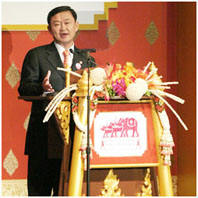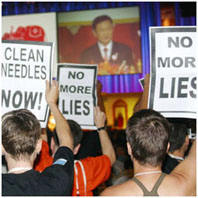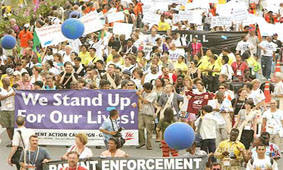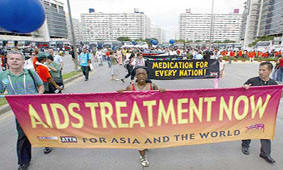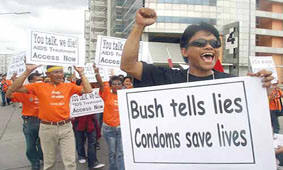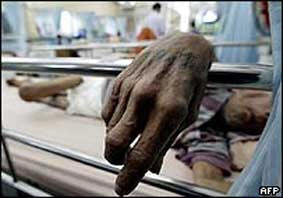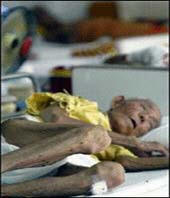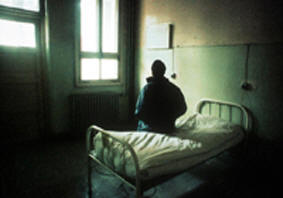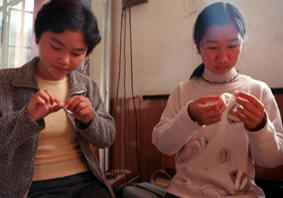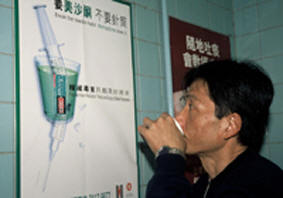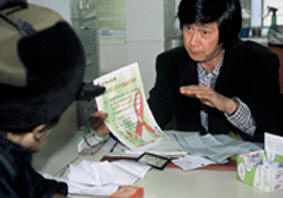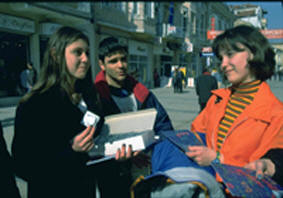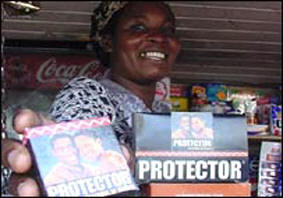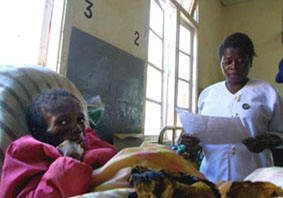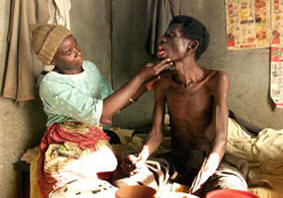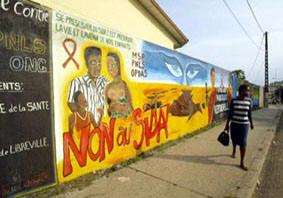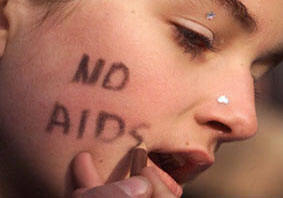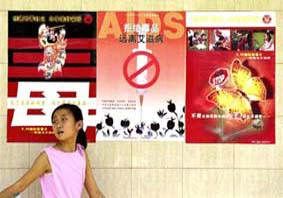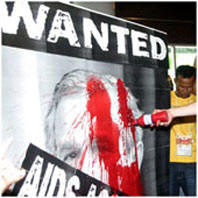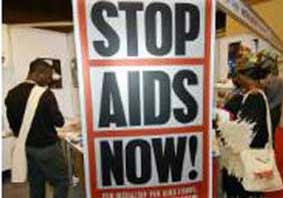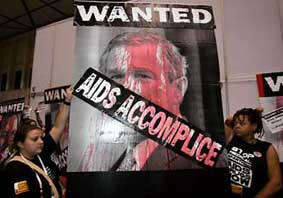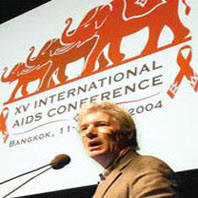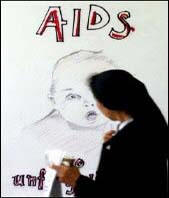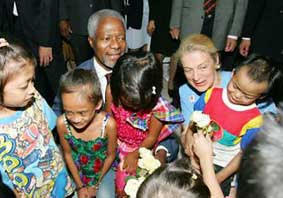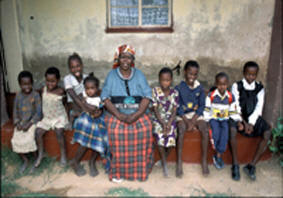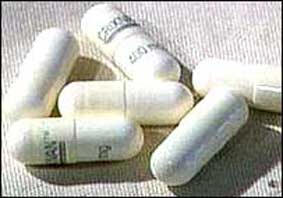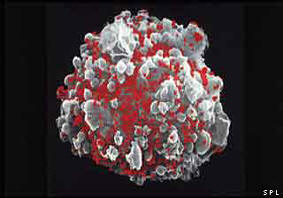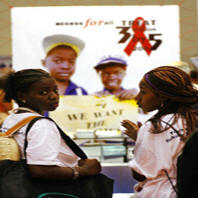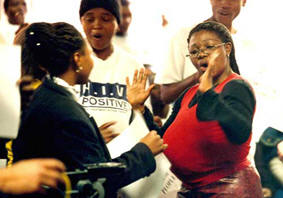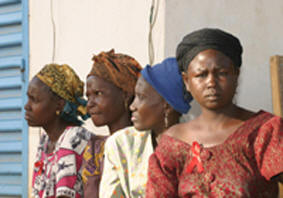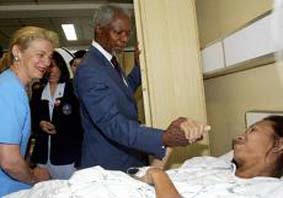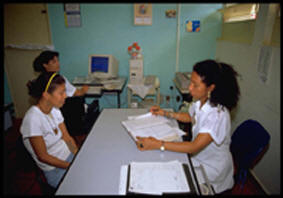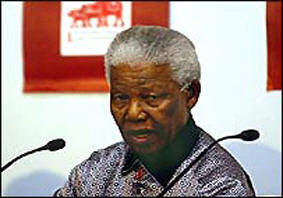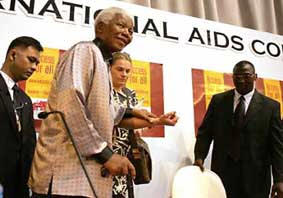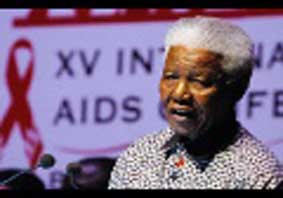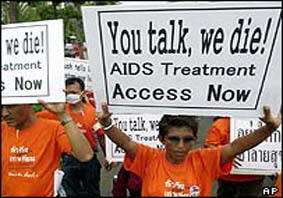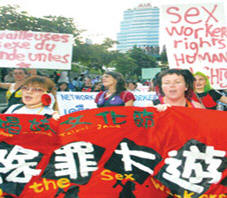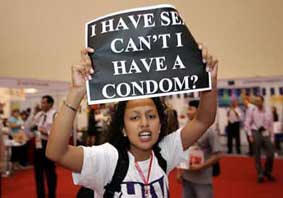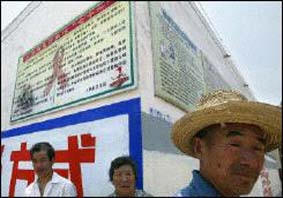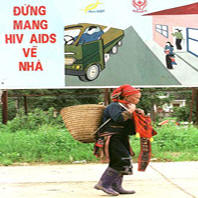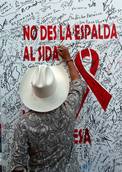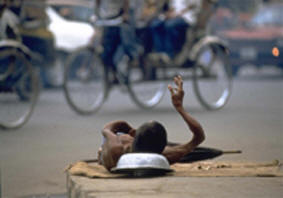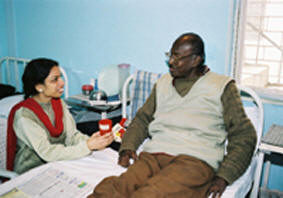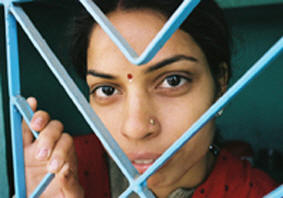![]()
AIDS CONFERENCE
15th International AIDS CONFERENCE BANGKOK 2004
|
|
|
World AIDS forum opens to warnings, protest and a challenge to leaders - July 11, 2004
The world's largest global forum on AIDS
opened amid dire warnings that a shortage of cash and lack of leadership
threatened a health crisis in the world's most populous continent of Asia.
UN Secretary General Kofi Annan told world leaders to make good on their
promise to tackle the AIDS pandemic as activists complained that governments
across the world had broken their promises over AIDS funding.
In his speech to launch the 15th International
AIDS Conference here, Annan noted many countries had sent health ministers
to the event, but "the fight against HIV/AIDS requires leadership from all
parts of government -- and it needs to go right to the top.
"AIDS is far more than a health crisis. It is a threat to development
itself," Annan said. "Leadership means showing the way by example."
The pandemic in 23 years has claimed more than 20 million lives and
threatens 38 million more who are living with the human immunodeficiency
virus (HIV).
Nearly five million more infections occurred in 2003, the highest in any
single year, and officials at the forefront of the struggle warned that the
world would have to improve or face dire consequences.
Women are increasingly bearing the brunt of the epidemic, yet one third of
all countries still have no policies to ensure women have access to
prevention and care, Annan said.
Experts have warned that HIV/AIDS in Asia has the potential to exceed the
disaster in sub-Saharan Africa where the worst hit countries such as
Swaziland and Botswana have HIV infection rates nearing 40 percent of the
population.
Richard Feachem, director of the Global Fund to fight AIDS, Tuberculosis and
Malaria, said disaster loomed if key contributors such as the United States
and Europe failed to put up the 3.5 billion dollars needed for programmes in
2005.
"If the Global Fund cannot continue to grow in its support for programmes
against AIDS, TB and malaria, the result is catastrophic, and we will not
win," Feachem told reporters.
"We will not turn around the HIV/AIDS pandemic, we will not stop TB, we will
not roll back malaria. It's absolutely black and white," he added.
Of the 4.8 million new infections last year, a quarter were in Asia, and
big-population countries such as China, India and Indonesia are especially
at risk, according to the UN.
In those countries, the epidemic is near the springboard point: after
increasing slowly for a number of years in marginal groups such as gays,
injecting drug users and prostitutes, the infection is about to leap into
the mainstream population.
Thailand, the host country, was widely praised after quickly distributing
condoms and launching anti-HIV programmes when the epidemic began to spread
quickly in the middle of the 1980s.
However, the administration of Thai Prime Minister Thaksin Sinawatra, was
criticised in a UN report last week for slashing funding, warning that the
potential was there for a new surge in numbers.
As he officially opened the conference -- the first in a developing Asian
country -- he was warmly applauded when he announced universal treatment
coverage for HIV patients.
But demonstrators heckled the prime minister and unfurled a banner saying: "Thaksin
Lies" in the middle of his speech as he addressed some of the 17,000
delegates set to attend over the next six days.
Earlier, about 1,000 people, most of them HIV-positive, protested outside
the venue over the shortfall of cash to fight the global pandemic.
"Where's the 10 billion? Treat the six million!" read one large banner,
referring to the 10 billion dollars donor governments pledged in 2001
towards the AIDS fight by the year 2005, and the six million HIV-infected
persons worldwide who need immediate treatment.
Contributions to fighting AIDS have risen substantially in the past two
years and are likely to reach more than five billion dollars in 2004.
But they are still running woefully short of what is required with an
anticipated 20 billion dollars estimated to be needed annually by 2007, the
UN said.
Activists criticized the administration of US President George W. Bush for
launching its own mechanism to funnel 15 billion dollars over five years to
fight AIDS in Africa and the Caribbean.
But US envoys fought back and challenged other countries to increase their
own contributions saying America put about twice as much money to work into
the fight than all the other donor nations of the world combined.
PM vows to save every life - July 11, 2004
Locally-produced drugs will also be made available to Burma, Laos and Cambodia.
Every person living with HIV/Aids in Thailand will get the medication needed to keep them alive, Prime Minister Thaksin Shinawatra will tell 15,000 delegates at the 15th International Aids Conference, which begins today.
Health Minister Sudarat Keyuraphan told The Nation that the Prime Minister would also announce plans to provide the locally produced anti-retroviral (ARV) drugs GPO-Vir to neighbouring countries Burma, Cambodia, and Laos, which have also been ravaged by HIV/Aids.
Thaksin's announcement will come at a crucial time, when improving greater access to treatment will be high on the agenda of the world's most influential meeting regarding HIV/Aids. The theme of this year's conference is "Access for All".
However, Aids activists are sceptical. With many people still unaware of their HIV-positive status and problems related to some doctors' unwillingness to treat Aids patients still common, ensuring universal access is easier said than done, said Paisan Suwannawong, of the Thai Aids Treatment Action Group.
Paisan will also address the opening ceremony on the issues of access to treatment, information, and prevention for people living with the reality of HIV/Aids.
Unless these pressing issues were tackled, and the government campaigned more intensively to inform people about its national programme to increase access to the ARV treatment, it was doubtful if Thaksin's promise would ever become true, said Paisan.
Thailand treats about 50,000 people living with HIV/Aids with GPO-Vir, the fixed-dose combination of three drugs; Lamivudine, Stavudine, and Nevirapine.
Sudarat said the goal was to extend the treatment to cover 70,000 people by next year.
All people living with HIV/Aids who are on the ARV drugs and able to work would be provided jobs and their children's education assisted, said Sudarat.
Sudarat said that the Government Pharmaceutical Organisation (GPO) will soon produce two more ARV drugs for those patients who cannot tolerate the GPO-Vir.
According to the GPO's director general Dr Thongchai Thavichachart, the two drugs his agency would start manufacturing in October are Saquinavir 400mg tablets and GPO-VIR Z 250mg tablets.
Sudarat acknowledged the possibility of using compulsory licensing for two major ARV drugs that are now patented. The two drugs are Merck's Efavirenz, and Abbott's Kaletra (a combination of Lopinavir and Ritonavir drugs).
However, there was no such plan in the near future, she added. If compulsory licensing was adopted, the government could authorise producers to use a patent without the patent holder's consent. "The GPO might consider using the compulsory licensing measure when it produces more ARV drugs that might need the raw materials from the patent holders," Sudarat said.
US TRADE PACT: Patients fear hike in drug costs- July 11, 2004
A 27-year old patient who constantly sees corpses being carried out from his ward, is nervous that he could be next .
Two years ago, Kamol Uppakaew would wake up to first light in his hospital bed wondering if this would be the last sunrise he would enjoy.
The 27-year-old spent more than two months seeing one body after another carried from his ward in fear that the next corpse to be wrapped in a white cloth would be his.
Kamol is not sure whether he believes in reincarnation, but he feels he has already been reborn thanks to the anti-retroviral drugs called GPO-Vir produced and first made available in 2002 to HIV patients inexpensively by the Government Pharmaceutical Organisation.
For about Bt1,250 a month Kamol was able to buy his life back, at least for as long as the drug remained effective.
But the free-trade pact the Thai government started negotiating with the US last month in Hawaii could cut Kamol's lifeline to the cheap drugs.
A key element in the Thai-US Free Trade Agreement (FTA) may force Bangkok to better protect the interests of US pharmaceutical companies, which may demand up to 10 times more per month from Kamol if he wants to live.
To link Aids to trade is a cause of alarm for Dr Jiraporn Limpananont, of the social-pharmacy research Unit at Chulalongkorn University's Faculty of Pharmaceutical Sciences.
In her soon-to-be-released study, "Impacts of US-Thailand FTA on Access to Medicines in Thailand" she predicts a doomsday for 695,000 people living with HIV/Aids in the country, of whom 96,000, or 14 per cent, are currently in need of anti-retroviral treatment.
Jiraporn studied the US FTAs with Singapore and Chile, which American negotiators are using as models for negotiations with Thailand. Alarm bells went off when she saw that the agreements tightened US companies' intellectual-property rights. This could restrict Thai patients' access to treatment, as patent terms might be extended to 25 years.
The reason Kamol even has access to inexpensive GPO-Vir is because the drugs are not patented. Some 15,000 patients receive GPO-Vir, and the government aims to increase the number of recipients to 50,000 this year.
But GPO-Vir is only good for three to five years, according to Jiraporn. After that the virus becomes drug-resistant, forcing patients to change to a second line of treatment. Second-line drugs are mostly patented, Jiraporn said.
Most patients pay Bt40 a day for the first-line treatment of generic anti-retroviral drugs like GPO-Vir. When changing to the second-line regimen, which contains mostly patented drugs, the average daily costs are around Bt370.
The studies estimated that if the Thai government continued providing second-line anti-retroviral drugs to people living with HIV/Aids over the next five years, its spending could increase by as much as Bt7.4 billion, compared to the current spending, which is about Bt3 billion a year.
"A five-year patent-term extension means a five-year delay in the introduction of cheaper generic products to patients," Jiraporn says, "whereas what Thailand needs is to request the US to shorten the patent term for the essential drugs, since it is a burden on Thailand in solving its health problems."
Moreover, the US is likely to limit the Thai government's rights to implement compulsory licensing, as authorised by the World Trade Organisation, to bypass patent regimes and produce generic drugs to combat public-health crises such as HIV/Aids.
"The US will want us to seek consent from patent-holders of the necessary drugs," she said. "Of course, those [pharmaceutical] companies will want to negotiate loyalty. That would delay crisis solution or jeopardise the whole thing if deals could not be agreed."
Kamol, who now leads the Thai Network of People Living with HIV/Aids, would along with other activist groups make this a major issue at the upcoming International Aids Conference. "The real battle for survival is about to begin," Kamol declared.
|
|
|
|
New anti-HIV drug brings good news in long-term tests - July 12, 2004
BANGKOK - The first new type of anti-HIV drug to be introduced in many years has proven to be remarkably effective in the first long-term trial of its benefits, according to data unveiled at the International AIDS Conference here Monday.
The treatment, Fuzeon, the first and only member of a category of drugs called fusion inhibitors, was authorised in March 2003.
It is a last-resort treatment for patients whose immune systems have been wrecked by the AIDS virus and are resistant to all other therapies.
Fuzeon was licensed after a 24-week study on a thousand people, unveiled in 2002, showed it could be, quite literally, a lifeline.
Amongst these volunteers, the presence of the human immunodeficiency virus (HIV) quickly plunged to below detectable levels -- although it was not eradicated completely -- and the count of CD4 immune cells, which are attacked by the virus, resurged dramatically.
Many patients who had been facing a death sentence were able to resume a full and healthy life.
In the longest study of Fuzeon, the drug was found to maintain this strong benefit after 96 weeks' use among the volunteers, according to Trimeris Inc. of the United States and Hoffmann-La Roche Inc., a US arm of Switzerland's Roche Group, which jointly manufacturers the treatment.
The drug was found to be safe and without toxic side-effects, and acceptable to patients. Fifty-six percent of patients who began the drug were still continuing the treatment after the 96 weeks.
Fuzeon, the patented name for a drug called enfuvirtide, works by preventing the AIDS virus from attaching itself to the wall of the CD4 cell. This is the first step before the virus crosses the cellular membrane and hijacks key DNA machinery in order to replicate itself.
Its offspring, called virions, are then spewed into the bloodstream and go on to attack other CD4 cells.
The other classes of antiretroviral drugs, introduced in the mid-1990s, try to block the replication process within the cell.
Fuzeon is used in combination with these drugs.
Despite its success, Fuzeon has drawbacks. It has to be injected every day, using a skin injector of the kind that diabetics use every day, and some patients were averse to this and complained of soreness and occasional infections at the injecting site.
It has to be kept refrigerated and is very expensive -- 53 euros (63 dollars) per person per day.
Those factors mean that it is inappropriate for hot, poor countries, such as in sub-Saharan Africa, home to two-thirds of the 38 million people with HIV.
|
|
|
|
Answer for HIV gel may grow on trees: Australian researchers - July 12, 2004
BANGKOK - Prayers for a vaginal gel to kill the AIDS virus, thus protecting millions of women from infected sex partners, may be answered by ... the humble lemon.
That is the novel suggestion made by Australian researchers, who have followed up ancient traditions in parts of rural Southeast Asia that lemon or lime juice, used intravaginally, can be a sperm-killing contraceptive.
In research to be presented on Tuesday at the International AIDS Conference here, a team led by Roger Short of the University of Melbourne says a solution of lemon juice -- when tested on a lab dish, not on humans -- was a mighty slayer of the human immunodeficiency virus (HIV).
"Provided that clinical trials confirm that intravaginal lemon juice is acceptable, safe and effective, it could prove to be Nature's own microbicide," according to a resume of their research.
Microbicides have been one of the most frustrating avenues of scientific efforts to find an alternative to the unloved condom to protect men and women during sexual intercourse.
A cream or gel like this would be a godsend, especially in Africa, where the majority of the 25 million with HIV are women who became infected through their husbands or boyfriends.
Women are especially vulnerable because they are expected to be submissive in sex, and cannot persuade or force their partner to wear a condom.
So a gel that they could use discreetly, and which would be cheap and cope with heat, rather than require refrigeration, would be ideal.
In all of AIDS' 23-year history, only one microbicide, a detergent molecule called nonoxynol-9, has been tested, and it proved to be a disaster.
It was trialled along with a lookalike product among more than 400 sex workers in Western Africa and South Africa and Thailand. Those who used the nonoxynol-9 three times a day or more were almost as twice as likely to get infected with HIV as those who used the placebo.
The apparent reason: the tough chemicals damaged the lining of the vagina, creating tiny lesions that helped HIV enter the bloodstream.
Six other large clinical trials of microbicides are either underway or about to start, and the quest has been given a push by a new initiative, the International Partnership for Microbicides.
Short's team tested various solutions of lemon juice on ejaculates of sperm from men with HIV.
A two-percent lemon juice solution had no effect in an hour-long exposure. When this was beefed up to 10 percent, replication of the virus was halved, and was non-toxic.
A 10-percent solution reduced replication by two-thirds and was also non-toxic.
And a 20-percent solution destroyed 90 percent of the virus within just two minutes, but with signs of toxicity.
Generic Drugs Extend HIV Patients' Lives - July 12, 2004
BANGKOK -- A few years ago, HIV was like a death sentence for tens of thousands of Thais who couldn't afford expensive imported drugs. Then came hope, in the shape of a one-pill generic drug cocktail.
When the Thai Government Pharmaceutical Organization started producing the three-drug pill in March 2002, monthly treatment for one person plummeted to $30 from $500-$750.
Thailand is one of the few countries making generic anti-AIDS drugs after overcoming challenges by European and U.S. pharmaceutical giants in a global patent fight that raised the question: What is more important - trade rules or people's lives?
The 146-nation World Trade Organization decided the latter, agreeing last September to allow poor nations to make copies of branded medicines to fight killer diseases in times of national health crises.
The use of generic drugs is a key topic at this week's International AIDS Conference in Bangkok, whose theme is "Access to All," a reference to giving each person infected with HIV access to treatment. That is an estimated 42 million people around the globe, more than half of them in sub-Saharan Africa.
According to the World Health Organization, only 8 percent of those in need now receive drugs that in rich countries have turned AIDS from a death sentence into a chronic disease.
Until two years ago, members of his group "were dying like leaves falling from a tree," said Kamol Upakaew, president and a founder of the Thai Network of People Living with HIV/AIDS.
Thailand woke up to its AIDS epidemic in 1991 when a record 142,819 infections were reported. In response, the government launched a nationwide program to raise awareness and to promote condom use.
In 1992, the Government Pharmaceutical Organization, started researching drugs that keep HIV under control.
Thailand expanded its free anti-AIDS pill program from 3,000 people to 10,000 in 2002 and to 50,000 people this year.
The program has made a visible difference, said Kamol, who has been an AIDS activist since he discovered he was infected with HIV in 1996.
"It changed from all our friends dying to: 'It's been two years now, and our friends are still here - we're still alive,'" he said.
In a population of 63 million people, about 600,000 Thais have HIV now, 19,000 of whom were infected last year.
The patent fight began in 1998, when Thailand was about to produce an anti-AIDS pill based on the drug didanosine and Bristol-Myers Squibb sent a notice saying it had a patent on the medicine.
Thailand stopped the project, but it was urged by the Belgium-based Doctors Without Borders to fight the American pharmaceutical company.
So the Government Pharmaceutical Organization took the case to Thailand's Central Intellectual Property Court, which ruled the Bristol-Myers patent invalid in Thailand.
The October 2002 ruling also said charities and individuals could challenge patents on social grounds, such as public health. Previously, only companies with a commercial interest could file complaints.
Thailand now has expanded its treatment program by producing a single pill that contains the medicines stavudine, lamivudine and nevirapine - a combination recommended by the WHO. The pill, taken twice daily, is easier for patients to keep up with than a regime that requires them to take three separate kinds of pill during a day.
The Government Pharmaceutical Organization, which makes six types of anti-AIDS medicines, supplies almost all its production to Thai hospitals, which are part of a national network giving free AIDS treatment.
Brazil, another big producer of generic anti-AIDS drugs, donates some pills to at least six African countries and plans to expand that to 14 nations this year. Generic drug companies in India also supply Africans with low-cost pills under an arrangement with the Clinton Foundation.
The Thai government plans to offer technological know-how to Africa, but for now must take care of its own because each year 40,000 to 50,000 more Thais need the pills, said Sombat Thanprasertsuk, director of the Thailand's AIDS bureau.
"This is a very big challenge because how can we cope with a high number of patients? We are trying very hard to look for even cheaper drugs," he said.
A long road of careful testing lies ahead before lemons or limes can be used this way.
The research is being viewed skeptically among experts within the microbicide sector.
"The concept is to buffer the pH [acidity] of the vagina and it's being actively looked at in a concept called Buffer Gel," said a specialist at the International AIDS Conference.
"Every concept should be tested first for safety."
But Short says the results should not be ignored.
"We've been looking for the microbicidal Cadillac, when all along we've been overlooking the humble push bike," he told the British science journal Nature last week.
Sex, AIDS and Thailand - July 12, 2004
The country dodged the HIV bullet in the 1990s. But it dropped its guard,
and now it's at risk again.
BANGKOK: -- For years, international health experts have pointed to Thailand
as a rare success story in the global battle to contain the AIDS epidemic.
The situation looked grim for the country in the 1980s, when doctors
reported that sex workers in Bangkok's famous red-light district were
beginning to test HIV positive. There were dire predictions that the virus
would spread rapidly through the population, infecting as many as 4 million
of the country's 65 million people by 2000.
It didn't happen. Instead, the Thai government launched a comprehensive
education and prevention campaign. Brothels started using condoms.
Public-service messages were broadcast on radio and television every two
hours. Anti-AIDS messages—often served with a healthy dose of sanuk, the
Thai sense of playfulness—were spread in schools, hospitals, police stations
and courthouses. After peaking at 143,000 in 1991, the annual number of new
cases of HIV infection fell to 19,000 in 2003. That still leaves 604,000
Thais living with HIV or AIDS, but it could have been much, much worse.
Now, as scientists and activists from around the world gather this week in
Bangkok for the 15th international AIDS conference, two new reports from the
U.N. warn that Thailand's triumph may be in jeopardy. While Thai men are no
longer visiting brothels in the numbers they once did, there has been an
increase in extra-marital affairs and casual sex, and condom use has fallen
dramatically. Meanwhile, HIV infection rates have spiked among young people,
pregnant women and intravenous-drug users.
Several factors have contributed to the worsening trends. "We have become
complacent," says Mechai Viravaidya, (a.k.a. Mr. Condom), a senator and the
principle architect of Thailand's successful anti-AIDS program of the 1990s.
"People think because they can't see HIV anymore that we have it kicked, and
they are taking risks again." Following the Asia-wide economic crash of
1997, successive Thai governments have slashed budgets for prevention
programs to less than half their 1997 levels. Condom funding is down,
education programs in schools have ended, and the media campaign has all but
disappeared. Meanwhile, other avenues of infection—such as drug users
sharing needles and men having sex with other men—have been largely ignored.
And in an understandable but no less ironic twist of fate, the advent of
effective anti-HIV drugs has lulled folks at all levels of society into
dropping their guard against HIV—just as it did in the U.S. and other
countries. "This government has done a good job on treatment and care," says
Dr. Praphan Phanupak of Chulalongkorn University in Thailand. "But they have
to get back into prevention. There needs to be a balance [between treatment
and prevention] if you want to contain this virus."
Despite recent setbacks, Thailand is still probably the most successful
country in the world in checking the spread of HIV. But AIDS flourish-es
where attention lags, and attention is lagging not just in Thailand but in
all of Asia, where 1 of every 4 new infections now occurs. HIV infection
rates have hit new peaks in China, Indonesia and Vietnam. And in India, 5.1
million people are now thought to be HIV positive—making it second only to
South Africa in number of cases. AIDS is not invincible, but it is
relentless.
|
|
|
|
Experts Tout Condoms in AIDS Fight - Jul. 12, 2004
BANGKOK, Thailand - Scientists, activists and policy-makers touted condoms Monday as a trusted weapon in the fight against AIDS, dismissing President Bush's policy of abstinence as a "serious setback" in efforts to control the pandemic.
Ugandan President Yoweri Museveni was the only big-name speaker at the International AIDS Conference to support Washington's ABC policy: Abstinence, Being faithful and Condoms, in that order.
Museveni said loving relationships based on trust are crucial, and "the principle of condoms is not the ultimate solution."
"In some cultures sexual intercourse is so elaborate that condoms are a hindrance," he told a plenary session. "Let the condom be used by people who cannot abstain, cannot be faithful, or are estranged."
However, U.S. Rep. Barbara Lee and other delegates urged the world's rich countries to spend more on condoms and other HIV-fighting programs for the developing world.
"In an age where 5 million people are newly infected each year and women and girls too often do not have the choice to abstain, an abstinence-until-marriage program is not only irresponsible, it's really inhumane," said Lee, a California Democrat.
Proponents say there is no better way to prevent HIV than by using condoms and giving clean syringes to intravenous drug users. Their philosophy is known as CNN, or Condoms, Needles, Negotiating Skills. The Bush administration maintains that emphasizing condoms promotes promiscuity among youth.
During a debate titled "CNN vs ABC," Steven Sinding, director general of the International Planned Parenthood Federation, said "condoms will remain key preventive tools for many, many years to come."
He said condoms should be seen as the key element of a comprehensive strategy including abstinence. The U.S. policy of emphasizing abstinence is a "serious setback to the AIDS control effort," he said.
By the end of the debate, ABC proponent Dr. Edward Green, a Harvard researcher and member of the President's Advisory Council on HIV/AIDS, suggested that a combination of ABC and CNN was the best solution.
Condoms have been promoted as a front-line defense against AIDS by countries such as Thailand, where a campaign to get sex workers to insist on condoms yielded a more-than-sevenfold reduction in HIV rates in 13 years.
Some 25 million of the 38 million infected with HIV worldwide are in sub-Saharan Africa, but the virus is taking root increasingly in Asia, where 7.6 million are infected.
In Asia, the sex trade has been the main engine behind infections in countries such as Thailand and Cambodia, where epidemics exploded by the late 1980s _ sparking aggressive responses, including campaigns to boost condom use.
Uganda has waged a successful battle against HIV in a rare success story for sub-Saharan Africa _ though some experts say it's unclear how the success has been achieved. Musaveni credited abstinence.
Uganda has brought its infection rate down from more than 30 percent in the early 1990s to about 6 percent of the country's 25 million people last year.
A young Ugandan, Simon Onaba, who gave an impassioned speech during the CNN vs. ABC debate, said abstinence works if people have the will.
"It is possible for young people to abstain. We are motivated, we are empowered. If I can start having sex, I can also stop having sex," he said.
However, epidemiologists tracking Asia's emerging epidemics told conference delegates the world's most populous continent face HIV problems largely driven by prostitution, and that promoting condoms is the best way to block further spread.
"I disagree with (Museveni). ... Condoms are greatly shortchanged in Africa as a prevention method," said Tim Brown, of the Hawaii-based think tank East West Center. "If you increase condom use by 50 percent, I guarantee you that HIV will go down by 50 percent."
There was consensus at the six-day conference, in its second day, that fighting the epidemic needs money that can only come from rich countries.
By 2005 an estimated $12 billion will be needed annually to fight the disease in developing countries, but current annual global spending now amounts to less than $5 billion.
"The $200-$300 billion spent in Iraq probably could have eradicated this illness," actor Richard Gere _ one of several celebrities at the meeting _ told a panel discussion.
Study paints bleak picture of gay life - July 13, 2004
An alarming number of gay, lesbian and bisexual Thai youths are forced into having sex, pioneering research by the Ministry of Public Health and the US Centres for Disease Control found.
In a study of 1,725 Chiang Rai vocational students aged 15 to 21, 26 per cent of the gay and bisexual males and 32 per cent of the lesbian and bisexual females said they had been forced "either mentally or physically" into having sex against their will.
Among heterosexual youths surveyed, about 5 per cent of males and 20 per cent of females reported having been forced to have sex.
"Sexual coercion has been found to be associated with . . . depression, suicide, unwanted pregnancy, STDs [sexually-transmitted diseases], and HIV infection," the researchers said, calling for counselling services and preventative measures, such as teaching children what to do when someone tries to force them to have sex.
The homosexual or bisexual youths surveyed were also about five times more likely to sell sex than their heterosexual peers.
"We do not have any good explanation for why sex in exchange for money, gifts or favours is more frequent among [homosexual and bisexual] youths," the researchers wrote.
One reason "may be that they have already crossed sexual boundaries in the face of moral disapproval by society . . . [which] may make it easier for them to engage in other morally dis-approved behaviours such as selling sex", they speculate in the article "The Prevalence of Homosexual and Bisexual Orientation and Health Risks Among Adolescents in Northern Thailand".
The research was conducted in 1999, but the data relating specifically to homosexual and bisexual youths was not published until April of this year, in the Archives of Sexual Behaviour.
The delay was caused in part by disputes over the words used to describe sexual orientation, one of the researchers said. They had been accused of lumping homosexuals and bisexuals together and had to spend a year rewriting the article, he said.
"The field of sexology is quite tacky with a lot of camps and everybody disagreeing," he added.
However, no matter which words you use to describe them, the study paints a bleak picture of the lives of Thai youths who are sexually attracted to members of their own sex - 9.1 per cent of males and 11.2 per cent of females surveyed.
In particular, the study found a high level of sexual activity and alienation among young gay and bisexual males. On average they start having sex two years earlier than their heterosexual peers (14.7 years versus 16.8 years), have more partners, experience greater social isolation, are more likely to suffer depression, and though they seldom use condoms rarely get tested for HIV.
The study also found that patterns of alcohol and drug use among Thai homosexual and bisexual youths differed from patterns in Western countries, with males using less and females using more than their heterosexual peers.
It found that homosexual, bisexual and heterosexual youths had one thing in common - a high rate of unsafe sex. The researchers called for more and better education and motivation programmes to discourage youths from having unsafe sex.
They also said that parents, teachers, healthcare providers and youth councillors needed to be made aware that there were many homosexual and bisexual youths in Thailand and that they faced particular health risks and problems.
This information, however, is proving difficult to disseminate, says Rainbow Sky, a group that provides HIV/Aids outreach programmes to Thailand's gay community.
The group's secretary, Rapeepun Jommaroeng, said that officials at the Ministry of Education
won't even speak to them. "They don't want homosexuals to exist," he says.
|
|
|
|
Elderly just as prone to disease as youngsters - July 13, 2004
Elderly people are just as likely as youths to contract HIV/Aids through sexual contact, especially when their children migrate to the cities, an HIV/Aids activist said yesterday.
Prasert Dechaboon, adviser to a Chiang Mai-based network for people living with HIV/Aids, said the elderly could become lonely and sexually active, even without the aid of nightclubs and brothels.
Five per cent of people who die of Aids-related illnesses in Chiang Mai are elderly, said another activist, but there is currently no data available on the number of elderly living with HIV/Aids.
Usa Khiewrord, regional project manager of HelpAge International, said the elderly are not targeted by mainstream HIV/Aids projects and therefore practise unprotected sex because they lack up-to-date information.
Prasert said the disease is often considered a form of punishment for wrongdoing and is associated with promiscuity.
"There is a social stigma for young men who get infected, but the social stigma is double for the elderly, who are expected to be respectable," he said.
A 10-year veteran of HIV/Aids campaigns, Prasert believes social movements like songs, books and other media are very important to teach people about the elderly.
But he said the elderly are often left literally "holding the baby" when their own grown-up children die of Aids-related illnesses.
In Thailand and Africa, where the elderly expect to be taken care of by their children, many elderly folk end up being parents again.
HelpAge said two of every three Aids patients in Thailand are under the care of parents or their elder relatives, while 30 per cent of the 42 million elderly people in African are taking care of grandchildren whose parents died of Aids-related illnesses.
Half of the children of Thai HIV/Aids patients are under the care of their parents, while 20 per cent of Zimbabwean orphans are under the care of the elderly.
Boon Srimai, 62, from Chiang Mai, became a parent again when her son died of an Aids-related illness years ago. Now she faces psychological and financial problems as she struggles to raise her 10-year-old granddaughter.
|
|
|
|
CHEAP HIV DRUGS: Scepticism over Thaksin's pledge - july 13, 2004
FTA talks seen as huge threat despite PM saying drugs won't be in US pact
Critics voiced doubt yesterday over Prime Minister Thaksin Shinawatra's promise to provide equitable access to life-saving drugs for all people with HIV/Aids in Thailand, saying it was a pipe dream while disputes over patented drugs remain unresolved.
The government has been able to provide treatment for people with HIV/Aids through its national health-coverage programme because it makes generic drugs - copies of US drugs not covered by patents in Thailand.
But Jiraporn Limpananont, a lecturer at Chulalongkorn University's Faculty of Pharmaceutical Sciences, warned that the free-trade agreement Thailand is negotiating with the United States could lead to the extension of patent periods for drugs produced by US pharmaceutical firms.
That could instead turn the tide and reverse the progress Thailand has made caring for people living with the disease.
Representatives of Medecins Sans Frontieres, the humanitarian group which won the Nobel Peace Prize, voiced the same concerns.
"For a developing country such as Thailand which has a limited healthcare budget, we could never afford the pricey patented drugs for HIV/Aids treatment," Jiraporn said.
Thaksin, in his speech at the opening ceremony of the International Aids Conference on Sunday night, pledged a strong commitment to "support universal coverage of anti-retroviral treatment to people with HIV and Aids".
The current treatment regimen is based on a generic fixed-dose combination produced by the Government Pharmaceutical Organisation. The price of locally-made drugs is about 10 times cheaper than the patented brand name medications.
The prime minister vowed last week that drug patents would not be included in the Thai-US FTA negotiations, but civic groups are still sceptical about his promise.
"The negotiations are carried out behind closed doors and the public is only informed of the end result. We are still very much concerned," Jiraporn explained.
Nimit Thien-Udom, director of the Aids Access Foundation, said Thaksin "speaks like a politician. We will have to closely monitor [the government's action]."
"If Thailand is to scale up its Aids treatment programme, it must be allowed access to cheap generic versions of patented drugs in the future", said Mohga Kamal Smith, health policy adviser for Oxfam GB, a UK humanitarian organisation
Smith said she was afraid the US would go country by country and use FTA negotiations to increase protection for patented drug to benefit its giant pharmaceutical producers.
Behavior of Johns Key to AIDS Fight - July 13, 2004
BANGKOK - The behavior of men who visit prostitutes will determine how bad the emerging HIV epidemics in Asia will get, according to an analysis by leading scientists.
The potential course of the virus in the planet's most populous continent came under scrutiny this week during the largest international AIDS conference ever, where more than 17,000 public health specialists, community leaders and scientists gathered to take stock of the global HIV disaster and step up the effort to fight it.
While southern Africa remains the worst-afflicted region, the front line of the pandemic is gradually shifting to Asia, where even low prevalence means that already more than 7 million people are living with the virus.
The region stands at a crossroad, experts say, where countries can either confront the disease head on and prevent it escaping the confines of prostitutes and their clients, drug addicts and homosexual and bisexual men, or let it creep into the general population.
"Asia will never be a sub-Saharan Africa," said Tim Brown, an expert on AIDS in Asia. "They are never going to see 20 to 30 percent of the population infected, like in Africa. Maybe 1 or 2 percent. The percentages don't sound bad, but the actual numbers are serious. We are talking big countries here."
"Every 1 percent I add in India or China adds 5 million people to the global HIV infection rate in India and 7 million in China. So, 1 percent in China or India is the grand total equivalent of what has happened in South Africa already. That's why we've got to worry, because the populations are so huge compared to the African populations," said Brown.
The virus is moving through Asia quite differently than it did in sub-Saharan Africa, the United States or Western Europe, said Brown, a researcher at the Hawaii-based East West Center.
The epidemics in Asia were seeded chiefly by injecting drug users, nearly all of them men, Brown said.
HIV prevalence keeps growing among drug addicts until a saturation point, which can reach 80 percent. When enough infected drug addicts visit prostitutes, an outbreak among sex workers takes off. The infection then moves from prostitutes to their clients, passing easily because the women are often also infected with other sexually transmitted diseases.
Some years later, the clients bring the disease to their wives, who then pass it on to their babies. Studies have indicated that about 20 percent of men who pay for sex infect their wives within two years. Over the course of their marriage, almost all of them go on to infect their wives, Brown said.
"That pattern has held in virtually every country in Asia. However, we do see huge diversity in the speed at which that pattern plays out," he said.
Homosexual and bisexual men also play a role in seeding the epidemics, but are not the main drivers in Asia, Brown said.
"Men who visit prostitutes are going to be the crux of the Asian epidemic. It is the men who drive this," he said.
The U.S. and Western European epidemics are almost entirely confined to injecting drug users, men who have sex with men and their immediate female partners.
In Africa, there's not much evidence that drug use contributed heavily. Prostitution played a role in the early days, but was not the dominant force. Experts agree that casual sex, coupled with poor control of other sexually transmitted diseases, was an important underpinning of problems in sub-Saharan Africa.
Both men and women there tend to have multiple partners. Studies have indicated that in the region, 20 percent of the men and about 10 percent of the women had multiple lovers.
The other engine driving the sub-Saharan Africa epidemic is sex across the generations, where young women are getting infected by older men.
Unlike in Africa, where 60 percent of those infected are women, females are unlikely to dominate the Asian epidemics, Brown said. He predicts that the prevalence will remain twice as high among men than women there.
"Women in Asia largely have sex within marriage and, for the most part, premarital sex is mostly confined to their future husband," he said. "On the other hand, the men are generally given a great deal of latitude in Asia. Sex remains a part of Asian business culture and that creates an imbalance and creates the demand for sex workers."
The fate of the Asian epidemics depends chiefly on what happens around the buying and selling of sex, Brown said.
Key factors influencing the results in Asia will be how busy the prostitutes are, how good control of other sexually transmitted diseases are, how widespread condom use is in commercial sex and ensuring that if the virus gets to the wives, it is not passed on to the babies, experts say.
However, Dr. Helene Gayle, incoming president of the International AIDS Society, said there are indications that Asia's next generation of women may not adhere to the sexual mores of their mothers and that casual sex is growing, increasing concern over the region's HIV epidemics.
So far, only Thailand and Cambodia have prevention on a scale that would make a difference. Aggressive programs focusing on commercial sex have brought new infections down, but drug addicts are largely being ignored.
Clean needles are considered important because delaying the spread from those men to the prostitutes buys time to get widespread condom use in place.
The worry is that some of the epidemics in Asia will progress so slowly that leaders will not view them as urgent enough.
"We have to get started now because unless we get the condom use up to 50 percent of 60 percent levels in the next few years we are going to lose control of these epidemics.
AIDS conference: US group strikes back against copycat drugs makers - July 13, 2004
BANGKOK, ( A little-known US group headed by an advisor to President George W. Bush attacked copycat drugs makers at the world AIDS forum on Monday, accusing them of exaggerating claims about the costs, safety and effectiveness of their products.
The broadside, aimed at the role of cheap "generic" drugs that are now playing a central role in the AIDS war, was delivered in a full-page advertisement in the daily Bangkok Post as the International AIDS Conference here began its first day of work.
"Beware of the hype," the ad was headlined. "HIV patients worldwide deserve safe, effective and abundant treatment options -- not false hope and false medicine."
Generic drugs manufacturers copy patented antiretroviral treatments and sell them at prices below those set by the wealthy pharmaceutical giants.
AIDS activists say these firms have helped drive down the cost of an annual regimen of antiretrovirals in developing countries from 10,000-12,000 dollars per person two years ago to several hundred dollars, or even lower, today.
The ad was placed by a group calling itself the AIDS Responsibility Project.
Its website says the organisation was set up in 2003 with the mission to "educate key policy makers and the general public to the unique needs of traditionally underserved HIV/AIDS-affected populations."
Its founder and head is identified as Abner Mason, a former policy advisor to the Massachusetts state government. He is a member of the 35-person advisory council on HIV/AIDS to US President George W. Bush.
"Rather than healthcare by press release, this conference should serve as an occasion to promote the principles of democratic governments; economic freedoms; infrastructure development; safe, approved and effective medicines and property rights," the ad said.
It took specific aim at the Indian generic maker Cipla, claiming the firm had attached "strict conditions" to a promise it made to the Clinton Foundation to provide antiretrovirals for just 140 dollars a year.
And, it noted, the World Health Organisation (WHO) on May 27 had delisted two Cipla AIDS drugs because they were not "bioequivalent" -- in other words, they did not work in the same way as patented drugs which had been licensed after exhaustive tests for safety and effectiveness.
US congresswoman Barbara Lee, who is attending the AIDS summit, criticised the advertisement as counterproductive to the fight against AIDS.
"I don't think that's a very positive message and we need to increase access to all to anti-retroviral drugs," said Lee, who also used the summit to slam the Bush administration's focus on abstinence rather than condom use as a means of preventing the spread of HIV.
The pandemic in 23 years has claimed more than 20 million lives and threatens 38 million more who are living with the human immunodeficiency virus (HIV).
European and US pharmaceutical companies have slashed the prices of patented drugs, partly out of goodwill and lobbying pressure but also because of competition from generics, which are principally manufactured in India, Thailand and Brazil.
This has caused the global market for HIV drugs to develop into two tiers: cheap drugs in developing countries and expensive ones in developed nations.
The pharmaceutical giants fought for many years against these rivals, arguing that copied drugs would leak into rich markets and hurt their profits, thus destroying the financial incentive to look for new drugs.
Thailand's health ministry came close to a patent showdown with US pharmaceutical corporations after it began selling its own locally produced antiretroviral drug in April last year at less than a dollar a day.
Asia needs sharp spending increase to counter AIDS: report - July 13, 2004
BANGKOK - Asia will have to spend more than five billion dollars a year fighting the AIDS pandemic by 2007, vastly more than its complacent leaders have released so far, according to research released Monday at the world AIDS forum.
More than seven million people are living with HIV/AIDS in the region, with 500,000 people dying each year, and if countries fail to act, Asia could see 10 million new cases by 2010, according to the Asian Development Bank and UNAIDS.
The potential annual cost would be 17.5 billion dollars, more than doubling the 2001 figure, according to the report.
The report also found that 5.6 million people would be impoverished in Cambodia, India, Thailand and Vietnam alone every year to 2015 by HIV/AIDS if the full extent of the crisis was realised.
Experts issued the report amid dire warnings about the epidemic in the world's most populous continent, particularly in India, Indonesia and China which account for 40 percent of the global total.
"If the incidence increases by one percent in the population in India or China, it will increase in number by five million in India and seven million in China," said Asian Development Bank vice president Geert van der Linden.
"Failure to quickly establish effective care and prevention programs can result in 10 million people becoming newly infected between now and 2010.
"Therefore it's no exaggeration to say the future of the global epidemic will be shaped by the Asian response."
Even rates of infection that are low compared with sub-Saharan Africa's translate into millions of people infected in the region due to its huge population, said the study presented at the world's largest ever AIDS conference in Bangkok.
India has nearly the same number of people with HIV/AIDS as South Africa -- which has the world's highest total -- despite low prevalence rates among the population.
In one state in India, one in eight hospital beds is estimated to be used for HIV/AIDS patients.
Vietnam, with an adult prevalence of 0.4 percent, has 220,000 people living with HIV/AIDS, significantly more than Swaziland, where adult prevalence is more than 38 percent, according to the study: "Asia Pacific's Opportunity: Investing to Avert an HIV/AIDS Crisis."
The seriousness of the problem has largely escaped public attention because leaders do not find the low national prevalence alarming, despite far higher infection rates in some areas.
But economic losses totalled 7.3 billion dollars in 2001 alone, borne overwhelmingly by lost household income, and experts called for immediate action.
"Investment in HIV/AIDS prevention, treatment, care and support in our region is meager," said Kim Hak-Su, executive secretary of the UN group focusing on Asia-Pacific, UNESCAP.
"This region needs to increase its resources by at least 25 times from the currently available 400 million US dollars from the public sector.
"National leaders must change their budgeting priorities while there's still time to stop a rapid escalation of the cost of care."
Health workers urged to stop discriminating against people with HIV/AIDS - 13 July 2004
Discrimination by doctors and nurses is undermining efforts to combat HIV/AIDS in the Asia-Pacific region, the International Federation of Red Cross and Red Crescent Societies and the Global Network of People Living with HIV/AIDS said today.
A new study by the Asia Pacific Network of People Living with HIV/AIDS (APN+) found discriminatory policies and behaviour from hospitals and their staff.
"We were shocked to uncover a wide range of discrimination," says APN+ adviser and principal investigator Dr Susan Paxton.
"We found people being refused treatment, treatment delays, breaches of confidentiality, people having to pay extra for treatment and women being forced to have an abortion or sterilisation."
Discrimination undermines all our efforts to encourage HIV-positive people to lead normal, healthy, productive lives in their communities, says Dr Paxton. The risk of this poor medical care is that HIV-positive people won't get the information and treatment they deserve to manage their own health and prevent the spread of AIDS.
"Sadly, such discrimination is common globally, and mostly based on ignorance," says Bernard Gardiner, manager of the HIV/AIDS programme of the International Federation of Red Cross and Red Crescent Societies, which collaborates with APN+ and the Global Network of People Living with HIV/AIDS to eliminate stigma and discrimination against people living with HIV/AIDS and their families.
Health workers are afraid of infection, even though standard infection control procedures provide full protection. They also make a moral judgment about how the HIV-positive person got the virus, which is against their professional ethics, Gardiner says.
Discrimination by health workers sends a message to the rest of the community that it is acceptable to take away the rights of HIV-positive people.
"We urge health workers to get informed about HIV and act humanely towards all patients. Experience around the world has shown that health care that empowers people to make their own choices, get information and access to services is more likely to promote positive behaviour and attitude change," he adds.
|
|
|
|
Doctors Say Pact Threatens AIDS Progress: A charity group urges Thailand to reject a U.S. trade deal that could end an affordable-drugs program, which is seen as a model for Asia - July 13, 2004
BANGKOK -- A potential trade agreement between Thailand and the United States could derail this country's production of inexpensive AIDS drugs and imperil the future of an anti-HIV program that is widely considered a model for countries throughout Asia, the group Doctors Without Borders said Monday.
"If the Thais sign such an agreement, they will have to close down their generic drug production," Paul Cawthorne of the Belgium-based group told a news conference. "Trade rules are the biggest threat" to the fight against AIDS, he said.
Thailand is one of the few countries -- others include India and Brazil -- that manufacture generic versions of anti-HIV drugs developed by U.S. manufacturers.
The country began researching manufacturing techniques for the drugs in the early 1990s and was preparing to market a generic version of the drug didanosine when Bristol-Myers Squibb Co., the drug's manufacturer, served notice that it held a valid patent on the drug. The Thai government was ready to accede, but Doctors Without Borders urged it to fight the claim.
The following year, Thailand's Central Intellectual Property Court ruled the patent invalid in Thailand, paving the way for the country to begin large-scale drug production.
That decision was, in effect, reinforced last September when the World Trade Organization agreed that poor nations could ignore patents in times of national health crises.
A free-trade agreement -- meant to greatly expand business exchanges between the United States and Thailand -- would incorporate language reinstating the patents, in an effort to protect U.S. drug companies. The Bush administration has also argued that the generic versions of the drug are potentially unsafe and that they are not as effective as the branded versions, a claim most experts dispute.
The reinstatement of patents was part of a similar agreement signed last year by Singapore. Brazil has refused to sign an agreement because of the provision.
Cawthorne, head of Doctors Without Borders in Thailand, urged the Thai government on Monday to follow Brazil's example lest it upset its thriving generic drug industry.
In March 2002, the Thai Government Pharmaceutical Organization began producing a single pill that contains the three drugs recommended by UNAIDS for first-line treatment of HIV infection: stavudine, lamivudine and nevirapine. The pill reduced the onthly cost of treatment for an individual from an estimated $750 to $30. The government now plans to provide it free to 50,000 Thai citizens.
Thai Prime Minister Thaksin Shinawatra said Sunday at the opening of the 15th International AIDS Conference here that the government would spend $20 million to provide about 40,000 of those patients with drugs and that the rest of the money would come from the Global Fund to Fight AIDS, Tuberculosis and Malaria. He also said Thailand would soon begin exporting the drugs to neighboring Cambodia, Laos and Myanmar.
Thaksin said Thailand would also offer its manufacturing technology to Africa in the near future.
The high cost of AIDS drugs has been a continuing theme at the meeting, whose title this year is "Access for All."
On Monday, activists shut down the large booth operated by GlaxoSmithKline at the conference center exposition, ringing it in a black band and waving signs reading, "Greed = Death.
|
|
|
|
Asia at high risk of developing drug resistant AIDS: experts - July 13, 2004
BANGKOK, HIV patients in parts of Asia run a serious risk of developing resistance to antiretroviral drugs due to the range of drugs available to them, stop-start treatment and lack of counselling and monitoring, experts at the world AIDS forum warn.
In China, where Nevirapine is a standard component of antiretroviral triple therapy, 50 percent of 500 rural patients who took the drug for up to 11 months have become resistant, said Shao Yiming, director of the China Centers of Disease Control's Department of Virology and Immunology.
The problem, Shao told AFP, was that China provided the free drugs last July without proper preparation.
Patients were not briefed by medical personnel that they had to take the tablets consistently.
Many stopped taking them for a while and then resumed and stopped again -- a perfect recipe for building resistance to a drug. Others quit taking the drugs altogether because of side effects, such as vomiting and headaches.
"We should not have put so much pressure on short-term gains. Instead we have paid attention to obtaining long-term gains," Shao admitted.
"The free-drugs program was meant to be save lives, but we should have considered whether it was sustainable."
Patients who develop drug resistance to Nevirapine now need to take different types of drugs, which are much more expensive and patented.
Nevirapine is an older AIDS drug whose patent has expired, and is copied by China's pharmaceutical industry. The switch to second-line patented drugs can triple the cost of treatment.
"Unfortunately, what's happening in most of the developing world is that the generic drugs which are being manufactured are simply the ones that they can make, which doesn't necessarily mean that the combinations put together are the most ideal," said Kevin Frost, director of TREAT Asia, a nonprofit group promoting safe AIDS treatment.
"There's a lot of concern that we're going to begin seeing resistance to Nevirapine on a more widespread basis here and I think that's of significant concern when it's such a critical component of every first-line treatment regimen in the region."
In countries where no free drugs are provided, the problem is worse.
In Vietnam, for example, patients buy cheap black market drugs or only take the drugs when they can afford them, stopping when money runs out and restarting again.
Many countries are only now becoming aware of the need to monitoring drug resistance.
Malaysia has been subsidizing HIV treatment since the mid-1990s, but is only now getting around to building a lab to do resistance testing, said Adeeba Kamarulzaman, head of the infectious diseases unit of the University of Malaya.
A China-based international expert, speaking on condition of anonymity, argued that the resistance problem could be averted if countries introduced "a simple mechanism" of encouraging compliance with the drug regimen.
"If the job is to make some people take it, just like taking birth control pills, do you really need the world's most well-trained doctors? Think about how China did family planning. They monitored every woman's menstrual cycle!"
Resistance to drugs occurs because the virus can undergo genetic mutations when it replicates.
A Darwinian survival-of-the-fitness phenomenon occurs. Strains of HIV which are impervious to a specific drug because it has been used in insufficient or irregular doses come to dominate the virus community.
That means another treatment has to be brought into use to attack this tenacious foe.
What complicates matters even more is that people who develop a resistance to a certain drug are more likely to become resistant to the entire class of drugs.
There are only three classes of AIDS drugs, which means poorly thought-out drug programs could leave patients much fewer treatment options and force them to take newer, more expensive drugs.
A longer-term worry is that the present generation of antiretrovirals could be wrecked if resistant strains of the virus emerge quickly and spread fast through the population by infection.
World Health Organization (WHO) expert Don Sutherland said that, despite these fears, "We're convinced this is good quality treatment when all the conditions are in place.
"When you consider what people are facing now, this is a good choice. It's better to start and improve upon it than wait, because patients cannot wait," Sutherland said.
"If you don't give the drugs to them, you have 100 percent failure. What's wrong with saving 50 to 60 percent of those lives?"
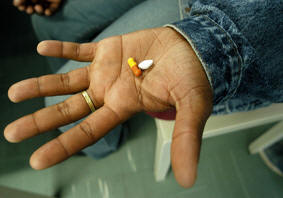
Youths want more say in efforts to fight pandemic - July 14, 2004
Representatives from the Joint United Nations Programme on HIV/Aids (UNAids), the United Nations Children’s Fund (Unicef), the United Nations Population Fund and the International Aids Society received a letter from the youths.
The youngsters demanded the creation of partnerships between youth organisations and international organisations working on the disease as they placed stickers reading “Honorary Youth” on officials’ shirts.
On Monday afternoon, five youths staged a far-reaching presentation for Carol Bellamy, Unicef’s executive director, ranging from basic facts and figures on the world’s HIV/Aids situation to original solutions to tackle the pandemic.
The presentation was based on the preliminary findings from two days of meetings among youth leaders from 15 countries including Thailand. They met as a run-up to the conference.
Through brainstorming and bringing to the table examples of the situations from their homelands, the youth leaders discovered that youths everywhere, from Cambodia to Egypt, face the same hurdles and difficulties.
Young people, they said, need more knowledge, information and skills to prevent HIV infection and stay healthy. They also need more safe and supportive environments, access to services as well as testing and treatment.
According to UNAids, more than one-third of all individuals with HIV/Aids are under 25 years old, and the age group accounts for more than half of all new HIV infections each year. Those between the ages of 15 and 24 are particularly hard hit, especially girls and young women, who comprise the majority of young people living with the disease.
People between 15 and 24 with HIV/Aids live in:
· Sub-Saharan Africa, 62 per cent,
· South and Southeast Asia, 18 per cent,
· Eastern Europe and Central Asia, 6 per cent,
· Latin America, 6 per cent.
Young people are uniquely vulnerable to contracting HIV, but they also are critical in responding to the epidemic, according to the Henry Kaiser Family Foundation. Where youths have been asked to get involved in campaigns, HIV transmissions have been reduced, particularly among their peers.
Several factors make youth particularly vulnerable, including their age, biological and emotional development and their financial dependence, according to a UNAids report.
Many surveys have shown that although more young people in the world now know about the disease, awareness is not universal.
Many are still ignorant about protection or have misconceptions about transmission.
Many sexually-active young people at risk of contracting HIV do not think they are at risk, according to UNAids.
Patcharin Khamjan, a Thai youth participant from Chiang Rai, said the younger generation in some countries do not even know what Aids is and oftenl do not know how the virus is transmitted.
Youths themselves can help to solve the problem if adults give them opportunities to speak out.
“They should give us the biggest say in what we need to protect ourselves from infection,” said Patcharin.
As another youth leader from Trinidad and Tobago put it, “We are the solution, not the problem.”
|
|
|
|
Drug war thwarts HIV battle - July 14, 2004
Thailand’s successful fight against HIV/Aids in the early 1990s, which has often earned the Kingdom international praise, has been undermined by a climate of fear in the wake of the government’s war on drugs that has driven injecting drug users underground, Human Right Watch said on Monday.
The war, launched in February of last year, has caused the deaths of more than 2,000 people and drove countless drug users into hiding and away from what few services exist to protect them from HIV, said Joanne Csete, director of HIV/Aids programmes.
The number of injecting drug users is increasing. Between 70 and 80 per cent of an estimated 274,000 heroin users currently fuel their addictions via syringes, according to a Human Rights Watch report. The report stated that drug users would account for 30 per cent of new HIV infections by 2005.
The Kingdom enjoys an international reputation as a “best practice” model in the fight against Aids largely due to its “100 per cent condom” campaign in the 1990s.
But with respect to drug users, the government has rejected similarly progressive HIV prevention programmes in favour of arbitrary arrests, mass incarcerations and forced drug treatments, said Jonathan Cohen, a Human Rights Watch researcher.
Cohen said his organisation had documented cases of drug users and traffickers becoming targets of state-sponsored killings and mistreatment, instead of being treated as victims or patients.
Many users were coerced into treatment during the war out of fear of arrest, while those who enrolled were given substandard treatment, often consisting of military-style drills in camps, he said.
“You cannot on the one hand say the people who use drugs are people who have a medical problem who need treatment and medical attention and on the other hand, command violence against people associated with the drug trade,” he said. “It creates a climate of fear that undermines any efforts to deliver comprehensive medical services to people who use drugs, and the government cannot have it both ways.”
|
|
|
|
Doctors back four drug regimens - July 14, 2004
With all the anti-retroviral drug combinations currently available on the market, people living with HIV/Aids often have their work cut out just keeping track of the numerous cocktails.
Four regimens of drug combinations are recommended above all others. But even trained physicians have trouble deciding which ones are best.
This is the biggest question faced by the World Health Organisation and UNAids, who plan to treat three million HIV-infected individuals worldwide by 2005. They have struggled to decide on the suitability of cocktails.
The ambitious treatment plan is called “Three by Five”.
“In retrospect, these regimens are well chosen,” Dr Sanny Chen, of Johns Hopkins Bloomberg School of Public Health, wrote in a study presented at the International Aids Conference yesterday.
By analysing HIV/Aids cases and mortality surveillance data in San Francisco, Dr Chen and his colleagues found that the four drugs used in initial regimens yielded the best odds of survival.
They also found no significant difference between them as initial regimens, although 3TC-D4T-Efavirenz seemed to yield a slightly better chance.
Chen said the study should be treated with caution, but he insisted it provided solutions to problems that were previously unapproachable.
Although far from conclusive, Chen said his study gives people living with HIV/Aids another piece of assurance that “Access for All” is also the best for all.
Grim situation: July 14, 2004
· The number of the Aids orphans increased in the past two years from 11.5 million to 15 million, with 12.3 million of them living in sub-Saharan Africa.
· In Botswana, the adult infection rate is 38 per cent, the highest in the world.
· More than 90 per cent of HIV-infected people do not know they carry the virus and this undermines global Aids prevention efforts, experts say.
· Last year the World Health Organisation and UNAids announced the “3 by 5 initiative” with the goal of treating three million people living with HIV/Aids by the end of 2005. This means every day at least 5,000 people need to be brought into treatment. To achieve this, experts say that each day 500,000 people will need to be tested.
· India has only one trained doctor for every 10,000 people living with HIV. Of these 500 doctors, only 25 can “be considered fully trained in all aspects of HIV treatment”, said N Kumarasamy of the YRG Centre for Aids Research and Education in the southern Indian city of Madras.
· There are less than 200 trained doctors available for 840,000 HIV-positive people in China, say officials from the New York-based American Foundation for Aids Research's Asia network.
· There are 27 local generic drug manufacturers in eight Asian countries compared to just one in Africa.
· UNAids, the United Nations programme on HIV/Aids, estimates that 1.7 million people in Asia need antiretroviral treatment, but less than 100,000 currently receive it.
· The discrepancy of physician preparedness ranges from one doctor for 24 HIV-infected people in Japan to one doctor per nearly 11,250 infected people in Vietnam, according to the TREAT Asia (Therapeutics Research, Educa-tion and Aids Training in Asia) report.
RETRO-VIRALS: Major pact for cheap drugs - Jul 14, 2004
New six-nation league will give
its signatories to generic, low-cost HIV/Aids medication
A landmark agreement between six countries – including Thailand – will give priority to increasing production of low-cost, generic versions of anti-retroviral medicines.
The agreement could improve access to medicines for as many as 10 million people.
Thailand, Brazil, China, the Russian Federation, Nigeria and the Ukraine formed a network to endorse the enforcement of major provisions of the Doha Declaration.
Low-cost, generic versions of branded anti-retroviral medication will be made by and for the populations of these six countries.
“Public health must come before commercial [interests],” said Alexandre Domingues Grangeiro, director of the Brazil Health Ministry’s National Aids Programme.
The Doha Declaration, adopted at the World Trade Organisation ministerial meeting in 2001, confirmed provisions made under the WTO Agreement on Trade-Related Aspects of Intellectual Property Rights (Trips) that allow developing countries facing a public health crisis to use compulsory licensing measures to produce generic medicines.
When the network’s production of generics is up to scale, the price of brand-name drugs will drop, said Grangeiro, benefiting, in his opinion, those in need of life-saving treatment.
According to the United Nations Joint Programme on HIV/Aids’ latest estimates, there are 3.6 million people living with HIV/Aids in Nigeria, 840,000 in China, 570,000 in Thailand, 860,000 in the Russian Federation and 360,000 in the Ukraine.
Using his own country as an example, Grangeiro said the price of anti-retroviral drugs in Brazil had already dropped by as much as 80 per cent.
The network also agreed to promote research and development of medications, including vaccinations, for HIV/Aids care, and build the capacity of respective health sectors through the exchange of knowledge, experience, technology and resources.
In order to implement the agreement, network countries say they will convene technical meetings during the course of this year to map out a detailed work plan. They are also looking to expand their coalition.
According to Grangeiro, India and South Africa were making their final decisions on joining the network.
“We are strong enough to face any future pressure,” he said.
Grangeiro said the initiative fund of US$1 million (Bt40 million) for the establishment of the network came from the Ford Foundation.
Preliminary discussions on forming the network began last September, and the pact was finally realised on Monday at the 15th International Aids Conference in Bangkok, when all of the member countries, minus Thailand, signed the agreement.
Deputy Public Health permanent secretary Pakdi Bhothisiri will sign the agreement today on behalf of Thailand.
Most of the countries’ representatives were ministerial- level officials.
Grangeiro said China was capable of supplying chemicals for the production of generic drugs, whereas the Russian federation was equipped with high technology for medical diagnosis.
He added that Monday’s agreement received positive responses from international non-governmental organisations, including WHO, UNAids and Medecin Sans Frontieres.
So far, there has not yet been any response to the network’s establishment from pharmaceutical giants.
Japan's Aids time bomb - July 14, 2004
The focus of most of the delegates to the International Aids Conference in Bangkok is on the enormous problems posed by the disease to developing countries.
But it is not just the poor who are unprepared to deal with Aids.
In Japan, one of the world's wealthiest societies, awareness of the risks posed by the disease is almost non-existent among many young people, and yet their sexual behaviour is increasingly risky.
While HIV infection rates in Japan remain officially low at around 6,000, experts fear the real total could be higher, and will get a lot worse unless attitudes begin to change to a disease many Japanese believe only foreigners can catch.
One Friday a month, gynaecologist Dr Tsuneo Akaeda visits Club Jamaica, one of dozens of places in Tokyo where young Japanese party till sunrise. He gives free blood tests for HIV - with almost immediate results.
University student Kuki Uchikawa, who has taken the test, said: "It's always been somewhere in the back of my mind, HIV, but I'm afraid I've never done much to protect myself in the past. This is the first time I've decided to come and find out more about the disease."
Among the volunteers helping Dr Akaeda is Mariko - she is 18, and has only just become aware of the risk HIV poses to her generation.
Poor education
"We never had much sex education at school. We were taught little about contraception, or how you catch HIV or other diseases. Teachers just don't feel comfortable talking about sex," she said.
Her friend, Madoka Izumi, also a high school student, agreed.
"I go to a girl's school, and we've never been able to learn what boys think about sex. They've taught us some of the physical sides of sex, but none of the emotional aspects, so we're not really prepared to deal with it," she said.
Yusuke Izumi, a university student, said: "I don't remember getting any sex education at school - we just talked about it among ourselves, about the things we did with girls."
Adults are probably oblivious about teenagers' sexual activity, Mariko said.
"Parents always think their children are different. They can't imagine them having sex or having abortions. They can only think of them studying hard at school."
By the age of 17, more than a third of teenagers in Japan have already had sex at least once.
There are other statistics which Dr Akaeda finds even more alarming. Sexually-transmitted diseases are rising rapidly among young women - a sure sign of having sex with multiple partners but without using condoms.
"Teenagers these days are very casual about sex. They're happy to have sex with anyone they meet - they use phrases like 'let's play together?'
"I gave away vouchers for free STD tests to girls, and found that 82% them were infected.
"It's incredible. I suspect a lot of them may have HIV as well."
In Japan, sex has become a freely-traded commodity, seemingly unconstrained by moral concerns.
Dozens of pornographic cable TV channels on sale here, and yet sales of condoms have been falling for several years.
Condom dearth
"We're very concerned about the negative image of condoms among young people, because it's not just HIV, but other sexually-transmitted diseases which are spreading," said Toshiaki Ishii, of the Okamoto Condom Co Ltd.
"We're trying to find ways to make them more appealing, but so far without success. I think the lack of sex education is partly to blame for this," he said.
The absolute number of people infected with HIV in Japan is still quite small - but unlike other developed countries, every year that number keeps rising.
And yet there is still a marked reluctance here to discuss the problem openly, or to run the kind of hard-hitting awareness campaigns that would wake this country up to the danger it faces.
That reluctance prevails even in the corridors of Tokyo's city government. Ida Mami, of the Medical Service's Division, is sounding the alarm over Aids awareness, but said getting more explicit sex education in schools is not easy.
"It is a sensitive issue. We have to start with what's possible, and avoid provoking a reaction from conservatives. If we push too hard on discussing condoms and safe sex in classrooms, some people may demand we stop all HIV education," she explained.
A start of sorts has been made in one of Tokyo's most elite girls' schools. They invited Dr Akaeda to educate, not the pupils, but their mothers - though only a handful turned up.
His use of graphic illustrations and even more graphic statistics had its intended effect - to shake any illusions they may have that their daughters are somehow immune to the wave of adolescent promiscuity sweeping Japan.
Social taboo
Actually talking about sex to their children, though, is another matter.
"Well it's rather difficult to bring this subject up in a casual way. If I can find the right opportunity, I hope I will feel able to discuss it," said one mother.
"I think this is a subject our children are already interested in, so I guess they'll understand if we raise it with them," another said.
Young people often seem like Japan's golden generation, unburdened by the work ethic of their parents, enjoying more leisure, more affluence, more security.
In such a cosseted environment it is hard to imagine the spectre of Aids. But it is here, and they don't seem to realise.
|
|
|
|
WHO Approves Four New Indian-Made Generic Drugs For HIV - July 14, 2004
BANGKOK - The World Health Organization on Tuesday put its seal of approval on four new Indian-made generic drugs against HIV.
The four drugs are 150 mg lamivudine, made by Strides (532531.BY), and antifungal fluconazole in three strengths - 50 mg, 150 mg, 200 mg - made by Cipla (500087.BY), said a WHO statement released in Bangkok, which is hosting the 15th International AIDS Conference.
It said they will be added to the WHO's so-called prequalification list this week, "further increasing access to a choice of quality products."
The lamivudine tablet is an alternative to the product manufactured by Cipla that was recently delisted by the World Health Organization because the laboratory that did its chemical analysis to confirm its efficacy didn't meet international standards. Such an analysis is known as bioequivalence test.
Approving Strides' lamivudine "expands the range of choice for that particular product to those programs wishing to use lamivudine," the statement said.
|
|
|
|
Central China province takes measures to care for AIDS orphans - 07-15-2004
Central China's Henan Province is taking measures to help the children whose parents have died of AIDS, guaranteeing their normal life, medical care and schooling, the provincial civil affairs department has said.
AIDS orphans are now fostered and adopted by individual families or by social welfare institutions in Henan.
The provincial government has ordered to exempt all the tuition fees of the AIDS orphans during their primary and secondary education periods, and provide them with special favors or allowance in their higher educational stages.
Every AIDS orphan will receive 180 yuan (21.8 US dollars) each year as a medical subsidy and a monthly life subsidy of 160 yuan (about 19.3 US dollars).
The provincial civil affairs department will provide another sum of money to the AIDS orphans when they are adopted and all the government departments are required to give assistance as much as they can when the related adoption procedures are taken.
Henan has also built "Sunshine families" in 20 townships where HIV virus is epidemic in a serious condition.
There are 35,000 HIV-carriers in Henan Province while the AIDS orphans number around 2,000.
Cheaper medicine for AIDS patients in China?
US-based pharmaceutical giant Glaxo-Smith-Kline has made a deal with the Chinese government to sell anti-virus medication for AIDS patients on the Chinese market at a "preferential price" until 2006.
The six medications, all used in the so-called "cocktail therapy" for AIDS patients, used to cost patients around 3,600 to 6,000 US dollars a year since China had to rely on imports. Medical experts in China are optimistic that the price of AIDS medication will continue to fall. They say each AIDS patient may, in the near future, only have to pay between 360 to 600 dollars a year for treatment.
|
|
|
|
INDIA: HIV Prevention Among Sex Workers in India - July 14, 2004
According to the current study, HIV rates of only 10 percent have been observed among sex workers in Calcutta, compared to rates ranging from 50-90 percent in Bombay, Delhi and Chennai. Condom use has also risen in Calcutta in recent years, from 3 percent in 1992 to 90 percent in 1999. Such figures may reflect the impact of the Sonagachi Project, a sustainable community-level STD/HIV intervention.
The World Health Organization selected the Sonagachi Project as a model of STD/HIV intervention. To demonstrate under controlled conditions that the project was responsible for the results in Calcutta, project staff designed and conducted a two-community trial to document the efficacy of the program. An external research team designed the assessment and conducted the analysis.
Two small communities in northeastern India were matched on size, socioeconomic status and number of sex workers and randomly assigned to an intervention and control condition. Each community's red-light area consisted of about 350 sex workers; 100 such workers were randomly selected in each area.
The Sonagachi Project was replicated including community organizing and advocacy, peer education, condom and social marketing and establishment of a health clinic. The enhanced intervention group included training by a team of local peer educators. The goals were to build skills and confidence in providing education and to foster empowerment and advocacy for local sex workers. The investigators conducted a baseline assessment with three follow-up assessments every 5-6 months over a 15-month period.
The researchers found overall condom use increased significantly in the intervention community (39 percent) versus the control community (11 percent), and the proportion of consistent condom users increased 25 percent in the intervention community compared to a 16 percent decrease in the control community.
"This study supports the efficacy of the Sonagachi model intervention in increasing condom use and maintaining low HIV prevalence among sex workers," the researchers found. "Too often, effective interventions are conceptualized based on theories of social change launched by university researchers. This intervention was designed by the community, is sustained by the community, and is taken to new communities by sex workers," they concluded. "Greater emphasis must be placed on interventions arising from communities if HIV prevention programs are to be sustained and broadly implemented."ì
GLOBAL: Novel Pfizer AIDS Drug Shows Promise in Trials - July 14, 2004
New research presented today at the 15th International AIDS Conference in Bangkok shows promise for a novel Pfizer drug, a tablet that blocks HIV from using the CCR5 pathway to enter human cells. The idea for blocking that route stemmed from the discovery of a well-known group of Kenyan prostitutes and rare American men with mutated CCR5 who, despite having repeated high-risk sex, never became HIV-infected.
The once-daily dose of UK-427,857 produced a 10- to 100-fold reduction of HIV in patients' blood after 10 days in placebo- controlled monotherapy trials - comparable to potent protease inhibitors. Dietary restrictions affect many AIDS drugs, but there was no significant difference in results between patients who did or who did not eat prior to taking the drug.
The firm is now conducting larger scale research. "It has enabled us to test once- and twice-daily doses in later trials and remove restrictions on how patients take the medication," said Steve Felstead, head of the drug development team. Pfizer hopes to start a final Phase III study involving hundreds of patients before the end of the year.
The hope is that the drug would have fewer side effects and provide a new option for people facing drug-resistant HIV. Since HIV can enter human cells by routes other than CCR5, such as CXCR4, the inhibitor candidate would likely be used in combination with other medicines.
Schering-Plough is also working on a CCR5 inhibitor product and expects to begin Phase III trials next year. A GlaxoSmithKline CCR5 product is thought to be further behind in development.
Debate rages on drug patents - July 14, 2004
Drug patents have emerged as one of the hottest debate topics at the International Aids Conference.
While multinational pharmaceutical corporations claim no innovation is possible without patents, their opponents ask what the point of innovation is when patients cannot afford the drugs.
Yesterday’s forum on intellectual property rights failed to reach a consensus on whether patents were a barrier to increased access to anti-retroviral drugs.
Some of the speakers claimed that protecting drug discoveries with exclusive commercial rights was a key incentive for companies to pour money into research and development, while others claimed this was a myth fabricated by the pharmaceutical companies.
Opponents of drug patents claimed that much of the research carried out on new drugs in the market today was usually based on studies by public-funded health and scientific institutions. They said the drugs were expensive because of marketing costs, not investment in R&D.
Hank McKinnell, president of Pfizer, defended the position of the drug companies, but his comments were somewhat overshadowed by scores of activists who marched into the venue carrying mock corpses wrap-ped in black plastic with the slogan “killed by pharma patent abuse”.
They were counterbalanced by 10 young protesters carrying banners supporting drug patenting and capitalism as prerequisites for new HIV/Aids treatments.
McKinnell said people in poor countries living on less than US$2 (Bt80) a day had not access to drugs, either generic or patented.
Public institutions and the private sector should help them by providing financial and technical assistance, he said.
“Let me assure you that your enemy is not patents,” he said.
“Its Aids that is your enemy. Now we have the [US] President Emergency Plan and the private sector is are also working hard to ensure patients get the treatment they need.”
Walden Bello, a sociology professor at the University of the Philippines and a prominent anti-globalisation activist, said the discovery of AZT by Burroughs Wellcome, now part of GlaxoSmithKline, was actually the work of staff at the government-funded National Cancer Institute and Duke University in the United States.
“Big pharma says it is developing 73 Aids drugs,” Bello said.
“Then they are quietly admitting that most of the firms doing this research are in fact receiving substantial government aid via publicly-funded researchers with the National Institute of Health.
“In other words, they are siphoning off taxpayers’ money for essential research and development.”
Thai Aids activist Nimit Tienudom said people living with the disease need to recognise that access to drugs is a basic right that every government should provide. They do not want assistance based on the mercy of pharmaceutical firms, he said.
The government should exercise compulsory licensing as allowed by the World Trade Organisation, he said. This would facilitate the production of an anti-retroviral drug known as NRTZ, now under patent by a pharmaceutical firm.
The drug could be available to 20 per cent of Thai patients who are allergic to the generic GPO-Vir, currently produced by the Government Pharmaceutical Organisation at inexpensive prices.
Free ARV drugs prompt many to declare HIV+ status - July 14, 2004
BANGKOK, : There might be a dispute over how successful the government has been in checking the onslaught of AIDS, but there’s no doubt that its decision to provide free anti-retroviral drugs to about one lakh people by the end of this year is already showing results.
According to the Indian Network of Positive People, the step has encouraged HIV-postive people to come forward and declare their status. The organisation has noted this trend in its centres spread across 13 states and 60 districts. According to the figures, the organisation was helping 6,000 AIDS-affected people since it was formed in 1997. But it has registered at least 4,000 more patients in the past six months.
People have heard about the free treatment and are coming forward and declaring their positive status in the hope of getting free drugs,’’ says Abraham Kurien, president of the Indian Network of Positive People.
The Women’s Group has also witnessed a similar trend. The trend is confirmed by international organisations as well. Julian V. Howes, the Interim Regional Coordinator of the Global Network of Positive People, says: ‘‘The availability of ARV therapy is one of the things that can lead a person to confirm his HIV status.’’ But there are conflicting figures in the 2004 Report on Global AIDS on the number of deaths. ‘‘When there are no exact numbers with the government, how can it give the number of estimated deaths,’’ said a NGO member.
The project for providing free medicines, the brainchild of former health minister Sushma Swaraj, has not found favour with the new government. In the past six months, just 900 people have been put on therapy. ‘‘If the people keep on registering, and there is no promise of medicine, the numbers might start decreasing again,’’ says Ramachandran. ‘‘The medicine, if discontinued after starting, can be fatal,’’ he adds.
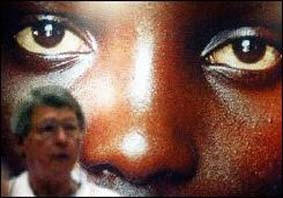
Lack of AIDS Doctors In Poor Countries Stalls Treatment - July 14, 2004
WANTED: Health-care workers who treat AIDS patients. Must like travel, long hours and scant pay. Your work may be halted because of a coup d'etat. You will bury friends. You might save lives.
These days, there is greater access than ever to cheap, generic AIDS drugs in the developing world. But a serious shortage of trained doctors, nurses and healthcare workers is hampering distribution of antiviral drugs in poor countries hard-hit by the epidemic.
Cambodia currently has just 50 doctors trained in HIV care, or one doctor for every 3,140 people with HIV, according to a study by the American Foundation for AIDS Research (AMFAR) and a group called TREAT Asia (Therapeutics Research Education and AIDS Training), a network of clinics and health institutions. In China, the world's most populous country with 1.25 billion people and almost one million patients with HIV or AIDS, only 200 doctors are adequately trained to treat AIDS. Vietnam has only 20 HIV-trained doctors, or on e for every 11,250 people with HIV.
Without qualified health-care workers dispensing the drugs, desperate patients are self-treating, under-medicating, splitting prescriptions with infected family members, or just dropping out of treatment -- creating a danger of resistant viruses. AMFAR and TREAT researchers say they've seen unqualified health-care workers handing out bottles of pills without explaining side effects or proper dosing, leaving patients ill-equipped to handle even simplified regimens.
The shortage of health-care professionals in developing countries has deep roots. Huge portions of the population are illiterate or badly educated, making these countries unable to produce a large pool of potential doctors. Poverty and famine make many people more concerned with putting food on the table than higher education or career development.
Those who do study medicine tend to leave rural areas in favor of practicing in more cosmopolitan cities. Among HIV-trained doctors in developing countries, there's a steady exodus to more prosperous places like Britain, New Zealand and Australia. Doctors in some parts of South Africa are "HIV doctors by default, which is a specialty ... in death. It's extremely depressing," says Krista Dong, a 42-year-old infectious-disease fellow at Massachusetts General Hospital, Harvard University's main teaching hospital, in Boston. Dr. Dong returned last week from three and a half years of treating patients near Durban, South Africa.
Global health officials say that despite many efforts to get HIV-trained doctors like Dr. Dong into developing countries, there is still a serious lack of coordination -- and funding.
"We're falling over each other," says Dr. Joep Lange, outgoing president of the International AIDS Society , who runs training programs out of his nonprofit foundation, PharmAccess International , based in Amsterdam. He recalls going to Abidjan , Cote d'Ivoire, to give a training course and encountering two training doctors from two rival courses -- all unaware of each other's existence. "We need a global plan of action," he says.
Can Western doctors help fill the gap? Not completely. Developing nations must supply their own health-care workers for their burgeoning AIDS crisis because there aren't enough Western doctors to help care for the staggering number of ill patients.
Yet in the U.S., no overarching national program or AIDS "peace corps" exists, so physicians who want to go rely on a handful of nonprofit, university or medical-school programs that send physicians abroad. Many are at Ivy League universities, including Harvard, Yale, Columbia and Brown.
There are also groups like the Academic Alliance for AIDS Care and Prevention in Africa, sponsored by the Infectious Diseases Society of America, along with Doctors Without Borders and missionary groups such as Catholic Relief Services.
Funding for some of the programs comes from pharmaceutical companies, the U.S. Centers for Disease Control and Prevention, the U.S. Agency for International Development, the National Institutes of Health and President Bush's $15 billion Emergency Plan for AIDS Relief.
Many say that's still not enough money to fill the doctor gap in developing countries. Mark Kline, who heads Baylor College of Medicine's International Pediatric AIDS Initiative, says he turns down about 100 American physicians a year because of a lack of funds.
The Baylor program, which is sponsored by the CDC, Bristol-Myers Squibb Co., Abbott Laboratories and the Fogarty International Center -- an AIDS wing of the NIH -- for a total of $1.4 million per year, sends 30 physicians to treat children in Uganda, Botswana and other developing countries for one- to two-month rotations. This year, Fogarty established a $2 million-per-year program for U.S. medical students to do their fourth year of school treating AIDS patients in developing countries.
But even with a healthy number of physicians interested in treating AIDS patients in poor countries, there are many obstacles to getting their foot in the door -- and in dealing with treating patients from different cultures.
Despite receiving some funding, Dr. Dong, who set up an AIDS clinic in South Africa, paid the rest of her expenses -- about $28,000 -- out of her own pocket and with loans, she says. That's difficult for many MDs who graduate from U.S. medical schools with over $100,000 in debt if they attend a private school.
Once U.S. physicians make it to the developing world, many realize that getting there was the easy part. It can take months -- seven in Dr. Dong's case -- to get a work permit to treat patients in some countries. Unfamiliar languages and food, disease and cultural dynamics are part of the learning experience.
Then there's the technology gap. When Bruce Walker, now the director of the Partners AIDS Research Center at Harvard, was treating a critically ill AIDS patient in South Africa, his medical instincts told him to say, "Let's get an X-ray and blood gas," both of which weren't available.
Professional frustrations take a quantum leap in war-torn countries. In Kinshasa, Dr. Marie Laga's women's HIV study was abruptly stopped due to violence in the capital. All embassies and international corps were told to leave. "I wasn't scared, but extremely sad at how years of work could collapse," says Dr. Laga, who joined Doctors Without Borders in Belgium.
Crime and social unrest are a deterrent. Peter Piot, executive director of UNAIDS, recalls that in 1976, he went to Zaire and Kenya at age 27 to work as part of the team that discovered the Ebola virus (he later switched to HIV work in Kinshasa, in the former Zaire, now the Republic of Congo). He endured threats like Ebola virus and drunken soldiers who put a gun to his head for money.
Dr. Dong, for her part, says she has forfeited marriage and children to work overseas. "I have seen several relationships take strain and marriages fail for persons who spent a large part of their work out of the U.S.," she says.
Despite the obstacles, physicians who have treated patients in developing countries say they want to make a difference. "Working here at [Massachusetts General Hospital], a million people could do what I'm doing," Dr. Dong says. In Africa, "a little work can have enormous impact."
Glaxo, Vertex drug keeps HIV at bay for two years - July 14, 2004
BANGKOK - A new HIV-fighting drug developed by GlaxoSmithKline and biotechnology company Vertex Pharmaceuticalse, has demonstrated sustained virus suppression over two years, researchers said on Tuesday.
The drug, which is known as Lexiva in the United States and Telzir in Europe, is part of a class of AIDS medicines called protease inhibitors.
It offers an advantage over older protease inhibitors because fewer pills are needed. Patients only take two pills twice a day, or one pill twice a day plus another drug called ritonavir. Other medicines can require as many as eight pills twice a day.
New data presented at the 15th International AIDS Conference showed 96 percent of patients taking Lexiva/Telzir plus ritonavir in combination with other antiretrovirals had undetectable levels of virus in their blood after two years.
The U.S. Food and Drug Administration approved the drug last October and a final European green light is expected soon, following a positive recommendation from a panel of experts earlier this year.
Lexiva/Telzir is chemically similar to an older HIV drug from Vertex called Agenerase. The new product is expected to cannibalise much of the Agenerase market.
AIDS robs 15 million children of parents - U.N. report - July 14, 2004
BANGKOK The AIDS epidemic has robbed 15 million children of one or both parents and reversed a trend toward fewer orphans driven by better health and nutrition, a U.N. report said on Tuesday.
With HIV infection rates rising and the incurable disease taking 10 years to kill without treatment, an estimated 18.4 million children will have lost at least one parent by 2010, according to the UNICEF report released at the 15th International AIDS Conference.
"It is a tidal wave of children who have lost one or more of their parents," Carol Bellamy, executive director of UNICEF, the United Nations children's agency, told Reuters.
"Fifteen million globally, close to 12 million in sub-Saharan Africa alone," she said. "It has the possibility of destabilising societies quite dramatically."
Without the AIDS epidemic, which has already killed 20 million people worldwide and infected 38 million, the numbers of orphans would be falling because of better health care and nutrition. AIDS has reversed the trend.
Much of the AIDS meeting that began on Sunday has been focused on money, improving universal access to life-prolonging drugs and wrangling over whether abstinence or condoms is the best way to prevent new infections.
But children's activists argue that the plight of orphans and vulnerable children is not getting the attention it deserves within the overall AIDS effort.
Boehringer, Glaxo Plan AIDS Drugs Pack for Poor - July 14, 2004
GlaxoSmithKline and Boehringer Ingelheim plan to soon offer the poor a cheap combined anti-AIDS drugs pack, they said on Monday, as pressure grows on drugmakers to do more to fight the disease's spread.
Unlisted Boehringer Ingelheim, Germany's largest drugmaker by sales, and GSK said in a statement the two firms had contacted the U.S. Food and Drug Administration to develop a package combining Boehringer's Viramune and GSK's Combivir.
"We will try and offer the drugs at very low prices," a Boehringer spokeswoman said. "We're targeting a level of price that is around the Accelerating Access Initiative prices."
The Accelerating Access Initiative is a public-private partnership to increase access to AIDS drugs that involves multinational drugmakers and United Nations agencies.
For Viramune, also known as nevirapine, the price under that programme can be as little as one tenth of the U.S. wholesale price.
The Boehringer spokeswoman said the drugs would be supplied in two separate blister packs in one carton. GSK's Combivir is itself a combination product that contains lamivudine and zidovudine, both key elements of anti-AIDS treatment.
A spokesman in Cape Town for AIDS pressure group Treatment Action Campaign (TAC) welcomed the move and hoped more drugmakers would follow suit.
"We hope more pharmaceutical companies will enter similar deals but more importantly that they start producing one combination drug," he said.
Indian drugmakers Cipla and Ranbaxy have already combined copies of lamivudine and nevirapine with a copy of a Bristol-Myers Squibb drug, stavudine, and offer the drugs in one pill.
Cipla told Reuters in Bombay on Monday it had received a South African patent for the combination.
Combining different drugs in one package is expected to help patients stick to the full treatment.
The Boehringer-GSK announcement comes as the AIDS crisis is being discussed at an international conference in Bangkok.
Ukraine Signs Joint Declaration To Combat AIDS -Official - July 14, 2004
Facing one of the fastest growing AIDS infection rates in the world, Ukraine joined an international alliance to battle the disease, Ukrainian health officials said Wednesday.
By joining the alliance, "Ukraine has recognized that the AIDS epidemic has exceeded the dimensions of a medical problem" and that it affects this ex-Soviet republic's social and economic development and causes irreparable consequences for society, a statement obtained by The Associated Press said.
Brazil, Russia, China, India, South Africa, Thailand, Nigeria and Ukraine are to formally sign the joint declaration during the 15th International AIDS Conference in Bangkok, which opened Sunday, UNAIDS officials in Kiev said.
The declaration stresses the need for experience-sharing in combating AIDS, providing easy access to modern treatments for those affected and improving research aimed at producing effective vaccines, the Health Ministry said.
Ukraine has the highest HIV infection rate in Eastern Europe, with some 500,000 people - 1% of the population - affected. Infection rates here have grown 20 times in the last five years, mostly among young people.
More than 60,000 Ukrainians are officially registered as HIV-positive, but the U.N. estimates that infection rates are 10 times higher.
An estimated 38 million people are infected with HIV worldwide, mostly in poor countries.
US Rejects Annan's Plea For $1 Billion Aid To Fight AIDS - July 14, 2004
BANGKOK - The United States' top AIDS official on Wednesday rejected outright a call by the U.N. chief for a $1 billion contribution in 2005 to a global fund combatting the epidemic, saying it is "not going to happen."
The hardline position by Randall Tobias drew a sharp response from Stephen Lewis, the U.N.'s special envoy on HIV/AIDS to Africa, who compared it with the U.S. stance on going to war in Iraq without U.N. endorsement.
"It shows on the part of ambassador Tobias an inability to recongize the way the world most effectively works," Lewis told The Associated Press.
Tobias, the U.S.'s global AIDS coordinator, said the country will this year spend $2.4 billion this year, almost twice as much to fight global AIDS as the rest of the world's donor governments combined. Any additional contribution to the U.N.-sponsored Global Fund to Fight AIDS, Tuberculosis and Malaria was unnecessary, he said.
"I don't think there is any point in doing that," Tobias said in an interview to the AP and Reuters news agency at the International AIDS Conference.
He said the Global Fund now needs to focus its energy on accelerating its infrastructure and the capabilites on the ground "so that we can put the Global Fund money already collected and sitting in the bank...put to work."
Washington has faced a storm of criticism at the AIDS conference over its funding policy, especially a $15 billion, five-year Emergency Plan for AIDS Relief, mainly directed toward Vietnam and 14 countries in Africa and the Caribbean. Activists complain that the countries were chosen because they shared the U.S. philosophy of stressing abstinence as a tool for preventing HIV rather than condoms.
They say the U.S. should instead give much of that money to the Global Fund, which reaches out to 128 countries.
In an interview with the BBC on Tuesday, U.N. Secretary-General Kofi Annan said he hoped that the U.S. would give $1 billion for 2005 alone to the Global Fund, which is far short of its $3.6 billion budget.
"It's not going to happen," Tobias said.
President George W. Bush has asked the Congress to approve $200 million dollars for 2005 for contributing to the Global Fund, and "I think that's going to be more than adequate to meet the requirements of Global Fund in terms of getting the money out doors and programs in place," Tobias said.
Bush had recommended a similar $200 million figure for this year, but Congress raised it to nearly $600. Tobias said he "would be opposed to that," saying Bush's request makes very good sense.
Lewis, the U.N. envoy, said he disagreed "profoundly" with Tobias, and said the best way to fight the scourge of AIDS would be for the U.S. to fold all its programs into the Global Fund.
He said the U.S. had "very little use" for the U.N. before going to war, but now the world body has become central to Washington's plans.
"At this point in time...Ambassador Tobias says $200 million, not a billion. As I stand here, two or three years from now Ambassador Tobias will understand that it can't be done without the United Nations and Global Fund as the essential vehicles."
|
|
|
Asia's Migrants Carry HIV Along Transit Routes -Report - July 14, 2004
BANGKOK - Migrant workers in Asia remain highly likely to contract HIV and spread it along the continent's main routes, and they need better access to health care while in the unfamiliar surroundings of their jobs away from home, U.N. and aid agency officials said Wednesday.
"Mobility exacerbates vulnerability to infection, and it also exacerbates vulnerability to the impacts of the disease once you're infected," said Michelle Munro, a spokeswoman for the Brussels-based humanitarian agency CARE International, citing two new studies.
She said migrant workers interviewed for the study, especially prostitutes, told researchers they were unable to find health care or felt too intimidated to seek treatment because of the stigma surrounding AIDS in Cambodia, Laos, Vietnam and Thailand.
"These health systems are already stretched," she said. "You've got a disease that people are frightened of...so you're at the edges of health care provision. So you don't go to the hospital, you don't go to the clinic because you're afraid someone's going to be rude to you."
Workers who found support got it from local communities and aid organizations rather than official health care programs, Munro said.
Male workers from Thailand and Cambodia who travel for work are increasingly returning home with HIV - often contracted from prostitutes - and infecting their wives, she said, adding that the epidemic also spread in a clear pattern along major roads in India and Pakistan.
Road improvements have prompted a surge in traffic, leading to a greater prevalence of HIV along routes in China, Thailand, Laos, East Timor, Vietnam and Myanmar, also known as Burma, said Lee-Nah Hsu, Southeast Asia representative for the U.N. Regional Task Force on Mobility and HIV .
Companies that build highways should be held responsible for bringing AIDS education programs to rural communities along their routes - who have perhaps had little prior contact with the outside world.
"You need to start when the roads are being built," she said.
Fishermen, sailors, agricultural and construction workers face a particularly high risk of infection and move from country to country, the two reports found.
Government efforts have proved inadequate in fighting the disease among the affected groups and must be improved, she said.
Promboon Panitchkpakdi, a representative for CARE's Thailand operation, said Thai fishermen - most of them young males - showed a particularly high rate of infection because they often visit sex workers onshore after working for stints of one to several weeks at sea.
Workers in Thailand's border towns, often a haven for sex workers due to lax law enforcement, also have shown a high incidence of the disease, he said.
Some 25 million of the 38 million infected with HIV worldwide are in sub-Saharan Africa, but the virus is taking root increasingly in Asia, where 7.6 million are infected.
Children missing out on HIV drugs - 14 July, 2004
Children with HIV/Aids are missing out on treatment because of a shortage of specially designed drugs, doctors have said.
Although more than two million children have HIV, few live in wealthier countries.
Medecins Sans Frontieres (MSF) warns the resulting lack of a profitable market means custom-made drugs for children are in short supply.
Doctors spoke out at the International Aids Conference in Bangkok.
Syrups are foul-tasting and pills are too big for children to swallow, said Dr David Wilson, medical coordinator of MSF programs in Thailand.
Doctors have to spend extra time working out the correct doses to give to children because the formulations are designed for adult-sized people, he said.
"Commercial pharmaceutical do not bother to develop paediatric formulations of Aids medicines because children are not an attractive market," he said.
Formulations designed specifically for children are more costly than adult versions.
The best price for one form of HIV treatment designed for children is about $1,300. The equivalent treatment for adults costs only $200 per patient, he said.
Neglect
Drugs are not the only problem. Standard tests to check for HIV infection are not reliable in infants younger than 18 months, doctors heard.
Monitoring drug treatment is also difficult because most of the commercially available machines that check CD4 levels - which reflects a drug's success in controlling the disease - are not adapted for use on young children, said Dr Wilson.
Fernando Pascual, MSF pharmacist, said: "Unless there is increased pressure on drug makers and intervention from governments, it will be years before new therapies are available."
Nearly 90% of children diagnosed with HIV live in sub-Saharan Africa and about half of them die before the age of two.
A spokesman from National Aids Map said: "One of the key differences between the HIV epidemics in rich and poor countries is the extent to which children are involved.
"There are relatively few HIV-positive children in the UK and other rich countries, but in poorer countries children are often bearing the brunt of the epidemic.
But he said a lack of appropriate drugs for children was a global problem.
"Even in rich countries, there are fewer drugs available for the treatment of HIV in children. Even when they are available they can be difficult to take, meaning that it is even harder to achieve the very high levels of medicine taking needed for anti-HIV drugs to work well."
Fighting India's Aids apathy - 14 July, 2004
India is looking at ways to contain the spread of the Aids epidemic - but many of its citizens don't want to talk about the issue.
The world's second most populous country has one of the highest infection rates - and more than five million HIV/Aids cases.
To counteract the spread of the virus, the government recently launched its biggest anti-Aids initiative to date.
But efforts are hampered by the fact that most Indians still find sex and Aids taboo subjects.
Stigma
In a corner of the St Katherine's Home in Bombay (Mumbai) a group of children are enjoying their playtime.
But despite their singing and laughter these are not typical five-year-olds - all of them are HIV positive.
They were infected by their parents before they were born and were brought here sick and, in some cases, close to death.
In a society where families are the main source of support, they are looked after by nurses and nuns.
Sister Shanti has 30 children in her care at this orphanage.
She says the hardest part for her is when people turn their back on children as young as these.
"It disturbs me when people discriminate against them.
"They have this disease through no fault of their own. They too have a right to live," she says.
Ignorance
For years many in India ignored the growing threat of Aids. Many simply could not imagine it was something that could affect them.
Down a crowded street in the heart of Bombay is the Unison clinic, one of the few in the city that deals with HIV patients. Ram Kewar is on one of his regular visits - he is among 20 HIV-infected people who come here every day.
He was infected by the virus a few years ago and since then has passed it on to members of his family.
He says he had never even heard of the disease, far less about how it can be transmitted.
"I thought it was just my fate to have got it. It was only much later that I found out why it had happened to me."
The new Indian government has identified Aids as one of its priorities.
But the biggest problem is combating ignorance - and that includes people who are very influential.
"One always hears about Aids and how it's this big problem. But I have personally never come across anyone with Aids or seen anyone dying of the disease," he says.
"I think it's just hype."
Taboo topic
But it's a problem which is not just confined to the poor or uneducated, or even the conservative.
It spreads across Indian society. In a trendy Bombay cafe young men and women draw on cigarettes and sip long cocktails.
They are part of cosmopolitan Bombay's elite - upwardly mobile, liberal and well-informed.
This is one section of Indians who are more open to talking about Aids - but they would never think of doing so at home.
"It has to do with sex and that's something which is an absolute taboo," says twenty-something Rocky Bhatia.
"Most families simply will not bring it up."
Sign of hope
But there's hope at the other end of the social divide.
Falkland Road right in the heart of the city is Bombay's red light district.
For years activists have worked closely with the sex workers operating out of tiny rooms and filthy alleyways off this busy street.
It's a move that is now paying dividends.
Monica is a sex-worker who has seen many of her colleagues die.
In the past decade, Aids has claimed the lives of thousands of sex workers. Now they are learning to be more careful.
Volunteers regularly visit every brothel handing out boxes of condoms and carrying out regular medical tests.
"If a customer refuses to use a condom we return his money and turn him away," says Monica.
"It doesn't matter how much money he offers us. Our lives are more important."
It is a small sign of success for a problem that needs to be tackled on a much larger scale.
Otherwise, it is estimated that in the next 10 years India could have more Aids cases than all of Africa.
Women catching up with HIV rate in
me - July
14, 2004
The HIV/AIDS rate among women is growing. The principal cause, researchers said, is women being infected by unfaithful male partners.
BANGKOK, Thailand - A generation ago, one in 10 of new AIDS patients in the United States was a woman. It's now one in four.
Worldwide, women made up nearly half of the adults living with HIV/AIDS in 2003, up from 41 percent in 1997.
In sub-Saharan Africa -- which has the world's highest rates of HIV/AIDS with an estimated 25 million cases -- there are, on average, 13 HIV-positive women for every 10 HIV-positive men -- up from 12 infected women for every 10 men in 2002.
In session after session at the 15th International AIDS Conference, delegates are coming to this conclusion: The biggest single cause of the gender epidemic is women being infected by men who are injecting drugs or having sex with multiple other women or other men.
"In many African and Asian societies, women's legal and social status is subordinate to men's, and they may have little or no control over the sexual behavior of male partners and often cannot negotiate the use of condoms," says U.S. AIDS researcher Dr. Zeda Rosenberg.
America needn't look down its nose.
'I've seen poor girls crying hysterically, saying, 'We've been together for two years, and he's still having sex with other women,' " says Sheri Kaplan, founder of the Center for Positive Connections, an HIV clinic in North Miami, who is attending the convention.
"A lot of women don't have the power to say no even if they believe their man is having sex with six other people."
U.S. MINORITIES
Across the United States, the problem is more acute among minorities. Black women made up 12 percent of the U.S. female population, but 64 percent of new female HIV infections in 2003, according to the Centers for Disease Control and Prevention. Hispanics made up 14 percent of the U.S. female population and 18 percent of new female HIV cases during the same period.
"The greatest risk factor for African American women lies in unprotected sexual intercourse with their male partners," says a new report by AMFAR, or American Foundation for AIDS Research. "Many are unaware that a partner engages in high-risk behavior such as male-to-male sex or injection drug use."
In Florida, Hispanic women are less at risk. They made up 17 percent of the female population and 11 percent of new HIV cases in 2003, according to the Florida Department of Health.
Across the world, the problem is worst in Africa. In a UNAIDS study of six African countries, girls and women ages 15-24 were 2.5 times more likely to be HIV-infected than their male counterparts.
Perhaps most tragically, the age of infection is getting younger. More than 11 million young people, ages 15-24, were living with HIV/AIDS in 2003, according to UNICEF and UNAIDS. Of those, 7.3 million were girls and women, 4.5 million, boys and men.
VIRGIN MYTH
"There is a widespread myth in Africa and parts of Asia that having sex with a virgin will cure AIDS, which has resulted in an increased number of child rapes," says a report by the American Foundation for AIDS Research.
And a session in Bangkok on violence, sex and AIDS revealed a litany of bad male behavior that spanned the globe:
* In the village of Cange, in rural Haiti, at a women's health clinic run by Partners in Health and Harvard University, a survey indicated that 54 percent of its patients had been forced into having sex at some point in their lives -- usually by their husbands or long-term boyfriends. Haiti, the Caribbean's worst-affected country, has 5.6 percent of its population infected with HIV.
'NO CHOICE'
'People talk about the 'ABCs' of HIV prevention -- abstinence, be faithful to your partner, always use a condom," said Partners in Health medical director Joia Mukherjee.
"But all too often the women have no choice."
* Young women 16-23 in rural South Africa who had been sexually abused as children were much more likely to later engage in such sexually risky behaviors as having multiple sex partners, having sex with men more than five years older than they and having sex for money.
* At a brothel in Bangladesh, 110 of 176 commercial sex workers interviewed said they had been punched, kicked, cut or burned with a cigarette in the past year, and a third of the time it was because they demanded that a client use a condom.
Few researchers believe male attitudes will change any time soon.
Still, countries are developing programs to make the attempt.
In South Africa, the government runs a "loveLife" youth information program promoting respect in relationships. In 171 countries including the U.S., MTV Network's International's 2003 version of the Staying Alive campaign does the same.
UGANDA CAMPAIGN
Uganda launched a national AIDS education campaign that strongly urged condom use.
The result: Uganda's national HIV rates dropped from 12 percent in the early 1990s to 4.1 percent in 2003, according to UNAIDS.
And if men won't change their ways, a new study presented in Bangkok indicates that young women can be taught how to deal with them more effectively.
In Atlanta, 522 sexually experienced African-American girls 14 to 18 were divided into two equal groups. One group received four four-hour group sessions on exercise and nutrition. The other got information about gender pride, HIV knowledge, healthy relationship skills and condom use.
The study was done under lead author Ralph J. DiClemente of Emory University's Center for AIDS Research.
In six- and 12-month follow-ups, the group given the HIV information was half again more likely to report more condom use, less pregnancy and fewer new sexual partners.
Later this week, a major presentation is scheduled for new methods for women to protect themselves, including a new class of drugs aimed at prevention during sex and an improved female condom.
Resistance to Abbott AIDS drug very rare-study - July 14, 2004
BANGKOK - Resistance to Abbott Laboratories Inc's anti-AIDS drug Kaletra is extremely uncommon, according results of a five-year study presented at a global conference on the disease on Wednesday.
Charles Hicks, associate professor of medicine at Duke University Medical Center in the United States, told the meeting researchers found no incidents of patients developing resistance to Kaletra in the trial, which involved 100 people.
"Even in people whose virus came back, there doesn't appear to be any resistance. That suggests it might be possible to use this treatment over relatively long periods of time," he said.
The patients examined were also given stavudine and lamivudine as part of a cocktail therapy to keep HIV at bay.
The investigation was funded by Abbott, which generated $383 million from U.S. sales of Kaletra in 2003 and worldwide sales of $750 million.
Drug resistance is a particular problem in HIV treatments because of the rapid rate at which the virus mutates as it reproduces. This gives multiple opportunities for it to evolve new ways to resist antiretroviral medicines.
Kaletra belongs to a class of anti-AIDS drugs known as protease inhibitors that prevent HIV from making viable copies of itself by blocking the protease enzyme, which HIV needs to replicate
Africa War Rapes Worsens AIDS Risk - Gro- July 14, 2004
BANGKOK - Warring groups in Sudan, Congo and Uganda have raped thousands of women and girls in recent months, putting them in dire danger of contracting AIDS, a humanitarian group said on Wednesday.
"Immediate steps can and must be taken by governments and civil societies to stop these attacks on women and girls which increase their vulnerability to HIV," the group Women's Equity in Access to Care and Treatment said.
"There is an immediate need of women and girls there for protection from further rape and sexual torture, access to emergency medical services, including post-exposure prophylactic antiretrovirals, rape counseling as well as food and shelter."
Releasing its case studies on various African nations, it said systematic rape by warring groups would exacerbate seriously the AIDS pandemic that is already destroying the region.
Rape "is an engine of HIV infection," the group's executive director, Anne-Christine d'Adesky, told a news conference at the 15th International AIDS Conference in Bangkok.
More than 25 million people are living with HIV/AIDS in Africa, two-thirds of the world's total.
Rape was also widespread in Rwanda when it was embroiled in genocide in 1994. Of some 250,000 rape survivors, the group estimates that 67 percent of them are living with HIV.
And the number is expected to rise as more women come forward for HIV testing, d'Adesky said.
But while systematic rape in Rwanda seems to have stopped, the same cannot be said for Congo, northern Uganda and Greater Darfur in Sudan, where violence against women continues.
"The most recent human rights cases cite girls as young as three years old raped by knives, guns and sticks" in Congo, the group said.
"We talk about medicines, abstinence, the Global Fund at this conference, but when we are talking about women and children in conflict, these things mean nothing," said Beatrice Were, an activist based in Uganda.
"For women in war, their fight is to live, to get treatment. It's hard even to imagine how to get medication to these areas in the first place," said Were of Action Aid Uganda.
Were, who contracted HIV from her husband and who has two children, also told of the immense suffering faced by women who have been raped and who living with HIV in Africa.
"Can you imagine the trauma of a woman who not only gets raped, but who contracts HIV because of that? She has to live with two stigmas, being raped and being HIV positive," Were said.
"And some even get pregnant. Can you imagine having to tell the child 'you are born out of wedlock, your mother is HIV positive and you may also be HIV positive'."
Thais to Launch AIDS Drug for Children in 2005 - July 14, 2004
BANGKOK - Thailand will launch a children's version of its three-in-one generic antiretroviral pill next year to simplify treatment of HIV-infected youngsters, the state drug agency said Wednesday.
"The drug is in clinical trials now and we hope to complete that and make it available on the market by the middle of next year," Government Pharmaceutical Organization (GPO) Managing Director Thongchai Thavichachart told reporters.
Thailand has produced some 40 million tablets of its GPO-VIR generic drug -- which combines copies of stavudine, lamivudine, and nevirapine -- since May 2002. The current dosage, however, is only for suitable for those aged 10 years or over. Those aged below 10 have to either split the tablet or take powder or liquid formulations.
"For those kids living in the far north, doctors have to prescribe gallons of different liquid formulas to them, which make their lives even more difficult," Thongchai said.
"With this first ARV cocktail tablet for kids in Southeast Asia, HIV-infected children will be treated more effectively."
Thongchai said there were about 5,000 children in Thailand in need of antiretrovirals.
Medicins Sans Frontieres, a leading medical and humanitarian organization, has said treating children with HIV/AIDS in poor nations is an uphill battle because drugs and diagnostic tests have not been adapted for youngsters.
GPO planned to spend 500 million baht ($12 million) to boost the production capacity for GPO-VIR to 200 million tablets a year from 50 million now, which would help treat 250,000 HIV/AIDS cases per year from 100,000 cases currently, Thongchai said.
GPO is researching and manufacturing 23 antiretroviral products and plans to add two more -- a saquinavir tablet and a concoction of AZT, 3TC, and nevirapine -- by October. ($1=40.68 Baht)
What they say . . .July 15, 2004
"The show must go on. We want to tell society that these people really exist."
Chantawipa Apisuk, founder of Empower group, in response to Health Minister Sudarat Keyuraphan’s criticism of a mock go-go performance at the Aids conference venue.
" Abstinence is meaningless to women who are coerced into sex. Faithfulness
offers little protection to wives whose husbands have several partners or
were infected before marriage. And condoms require the cooperation of
husbands."
Thoraya Ahmed Obaid, a Saudi woman who is executive director of the UN Development Fund for Women, referring to US President Bush’s dream of braking the spread of Aids by encouraging sexual abstinence among young people.
"I could not believe it. I wanted to kill myself and abort my child. I was
so afraid that my child would be infected and would be hated by everyone..."
Chompoo Yokhee, an infected Thai woman.
"At this point, perhaps the most critical mistake we can make is to allow
this pandemic to divide us. When 8,000 lives are lost to Aids every day,
division is a luxury we cannot afford."
US global Aids coordinator Randall Tobias, seeking to defend US plans for tackling the dis
ON THE SIDELINES: How to handle protesters
On the table of every panel is a piece of paper with guidelines for handling protestors during panel discussions. The chair of the session should remain calm and in control. He or she can ask the protestors if they have a statement to make so they can be heard. It comes as no surprise by now that protestors are common at such a huge, weeklong gathering.
Young students see sex
workers
Three dozen students from Satri
Nonthaburi School had a rare chance to see how sex workers live. A skit
performed at the Global Village offered a realistic glimpse of the nightlife
of bargirls, constantly harassed by police and sometimes by foreign visitors.
The Sex Workers Network wants people to understand their living conditions
and the problems they face.
Do you want one?
“Do you want me? I am a ladyboy,
only 200 baht.” “What did you say?” asked a curious foreign visitor. “Yes,
200 baht.” “You, well...” murmured the man. “Do you want?” asked the ladyboy
(her own word) looking after the GLBT Network counter. At the booth,
well-known transgendered personalities dropped by to chat.
Female-condom demo
There were lots of “Oohs” and
“Aahs” at the female-condom demonstration. “You have to spread your legs
this way, then insert the ring this way. Make sure it doesn’t slip,”
instructed Dr Pravin Payakviphapong, deputy director of the Population and
Development Community (PDC). Sometimes, Dr Pravin said, male partners cannot
use a condom, because of illness or rubber allergies, so a female condom
must be substituted. Dr Pravin also unconventionally counselled young women
that if they and their boyfriends get the urge to have sex, they opt for
less than the Full Monty. n other words, well, just help the young man
finish his business. That is all he needs, all manner of undesirable
consequences can be avoided.
Awards
The Thai Drug Users’ Network,
which works to protect the rights of drug users in Thailand, yesterday
received the Award for Action on Aids and Human Rights, conferred jointly by
Human Rights Watch and the Canadian HIV/Aids Legal Network.
There are up to 250,000 intravenous drug users in Thailand today..
WOMEN ON TOP: Women want say in treating their own infections - July 15, 2004
Emphasis on condoms leaves women little say in how they’ll protect themselves
Don’t get the wrong idea. The topic at hand is not the “Kama Sutra”, but rather the position of women in regard to their own protection against HIV/Aids.
Prevention against the virus has long been male territory. Condoms may only be used with men’s compliance, leaving women almost no chance to protect themselves. Alarmingly, half of all new HIV infections worldwide now occur in women, while vaccines still remain a relatively distant hope.
But women will soon have more ways to get on top of this unfair situation, promised scientists and delegates at the 15th International Aids Conference in Bangkok yesterday.
Until now, female condoms have been the only womaninitiated protection, but high prices have so far prevented them from becoming widely available, despite acceptability among women in many countries. That will change very soon.
“Some research has been done on new prototypes of much cheaper female condoms. I think we are going to see them in the next year,” said Dr Helen Reese of South Africa’s University of the Witwatersrand.
In addition, diaphragms, routinely used in pregnancy prevention, are being evaluated for their potential to prevent HIV infection, as scientists have recently discovered that the cervix is more vulnerable to infection than the vagina.
Diaphragms may also be used discreetly, without a partner’s knowledge, unlike female condoms. (Dr Reese did note that some women reported their men are often too drunk to notice the difference anyway.)
For those women who want to have children, the price of conception may no longer be certain infection.
Many studies of topical microbicides have reached the late stages and will likely bear fruit in a few more years. Even a modestly efficacious microbicide could save millions of lives, not just of women, but of their partners and children, too.
Also under investigation is the antiretroviral drug tenofovir as preexposure prophylaxis against HIV.
“When we meet again in Toronto [at the 2006 Aids Conference], we’re going to have exciting information about the results of these studies,” said Dr Helene Gayle from the Bill and Melinda Gates Foundation, which funds them.
It is hoped that these preventive measures can soon be applied synergistically to offer a previously unattainable high level of protection for half of the world’s population.
Due to the unavailability of the researchers, the potential HIVprevention impact of adult male circumcision could not be discussed as planned.
But it is suspected that it will not go down very well with the other half of the population. Maybe it is time for them to take condoms more seriously.
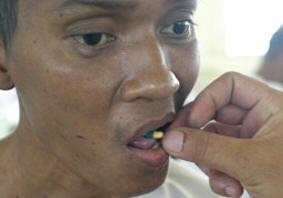
Feature: Christianity helps communities fight the disease- July 15, 2004
A transparency of a child struggling to hold on to a piece of bamboo raft amidst a fierce thunderstorm on rough seas is clearly projected on the wall. The shot is as clear as what Apidej Chairacha has in mind when he thinks about the plight of the infected and affected children whose parents passed away after bouts with Aids, leaving the children with their grandparents.
Apidej is a pastor and director of the Community Care Network in San Patong district. He is determined to save these “drowning” children and in that vein, focuses his Aids activism on children, youth and the elderly.
The first floor of the Community Care building has been turned into a foster home for about ten kids, ranging from 6 months old to those who can attend a regular school – usually four years old. They are infected and affected children whose parents or grandparents do not have enough time to take care of them during the day.
Six year-old Nok (not her real name), has been dropped off by her HIV-positive mother every day since she was eight months old. Because she is affected by slow mental development, she cannot attend regular school yet.
The home is more than that, though; it is also a network base for over a hundred elderly groups in five sub-districts co-ordinated by uncle Kaew. The network regularly holds activities and brings guest speakers to talk to about Aids-related issues. The elderly also spend time together growing and selling mushroom to earn money. They are now being trained in providing Thai massage.
Apidej works particularly hard training a group of 15 youth volunteers – three each from five sub-districts – to take care of children affected by HIV/Aids and Aids orphans in their own communities. He believes that Aids prevention work needs to be dynamic and “community work requires good lubrication” – oil that greases community cogs, like the volunteers.
Among the fifteen youth volunteers are Benz and Meaw, students at Chiang Mai International Business College. Each of them watches over three to four kids, mostly affected rather than infected, from their Tambons.
Benz, an Apidej volunteer since the age of eleven, visits his children at their homes regularly to observe their problems and functions as a mediator between the needs of the kids and their parents. Almost every Saturday, Benz teams up with Maew and the other volunteer in Tambon Chaechang to help children with their homework. Every semester the whole group of 15 holds a camp that educates a hundred children on Aids, sex and violence.
Benz and Meaw were drawn to volunteering at Community Care because their backgrounds and the lives of the children they help have been affected by similar tragedies. Benz’s two uncles died of Aids. Meaw’s uncle, aunt and cousin live with HIV.
They are also both Christians, as are many of the people in their sub-district. Meaw and Benz met Apidej at church. After hearing about Apidej’s work, they approached him and expressed interest in joining his Community Care youth volunteers. They believe Christianity has facilitated a larger international mission of helping communities fight Aids.
Even Buddhist Kruewal “Wal” Paddee would agree with that assesment. Wal is the founder and ex-president of Ku Larb Luang (Yellow Rose) from Tambon Maeka, founded eight years ago. Ku Larb Luang is the largest of the 18 People Living With HIV/Aids (PLWHA) groups in Phayao, currently supported by Ban Metta Dharma, run by Sister Mercedes Karuna Placino.
Wal recounted the first time she met someone who shared her ideas and commitment to the fight against HIV/Aids seven years ago. Sister Karuna came to the local social development centre seeking volunteers to work with on HIV/Aids issues. Wal approached her and insisted on joining, even though the Sister made it clear she could provide no salary.
From then on, Ban Metta Dharma has been working with Ku Larb Luang.
Ban Metta Dharma supports 160 Ku Larb Luang members – 54 elder people, 84 infected and affected children and 22 infected adults.
Prevention is lacking in Asia - July 15, 2004
HIV flies “below the radar” in many Asian countries because their leaders do not give it the attention it deserves, a leading Aids researcher told the International Aids Conference yesterday.
Infection rates in the general population is below 1 per cent in many countries in the region, but sex work, needle-sharing and homosexual sex are the engines of the Asian epidemic, said Tim Brown, senior fellow at the Hawaii-based East-West Centre.
Prevention efforts, hence, should target those groups, but existing programmes in most of Asia don’t reach them, he said. Prevention efforts for drug users and ho-mosexual men are largely in the pilot stages, and sex workers are usually ex-cluded.
The slowly evolving epidemics of Asia are dangerous, growing steadily and silently, he said.
Leaders need to take action and implement good monitoring systems. And while most of new infections hit the male population, there are no good HIV surveillance systems aimed at this group, he said.
Brown based his projections on an “Asian Epidemic Model” he developed with other researchers including Thai scientists.
There is no such thing as national immunity to HIV, Brown said. Based on the mo-del’s output, the situation in Asia “represents a steady, serious in-digenous growth of HIV that will have serious consequences for the continent in the future,” he said.
He said the epidemic often starts in the same way – first affecting injecting drug users, later homosexual men, sex workers after that, then their clients and finally pregnant women.
Despite the similarities in the pattern, the spread of HIV in Asia varies from country to country, in terms of levels of infection and in the timing, Brown said.
While Cambodia, Burma, Thailand and several states in India are in the early stages of the epidemic, the infection has been slightly delayed in China, Indonesia, Nepal and Vietnam. In those countries the national HIV infection rate does not exceed 0.5 per cent.
HIV has affected less than 0.1 per cent of the population in the rest of the region, including Bangladesh, Japan, Laos and the Philippines.
But this rather low rate of infection might hide the real threat of the epidemic, Brown warned.
Calculating the future scenario using his model, Brown, who has done extensive HIV/Aids research in Asia including Thailand, said that a gradual epidemic like the ones in China, Vietnam and Indonesia might be concealing the real threat.
He projected the rate of infection in those countries would reach 1 per cent of adult males by 2010, and almost five per cent by 2030.
While the future of the epidemic looks bleak, the focus should be on prevention, said Brown.
He said a 60 per cent level of condom use would reverse the growth of the epidemic. But this means that 60 per cent of all sexual contact must be protected and few Asian countries have scaled up their prevention programmes to achieve this. Con-dom use in Bangladesh, China and Indonesia, for example, remains at 20 per cent or less, he said
Cultural, gender barriers a problem - July 15, 2004
Zambia: laws must be changed to address abuses in name of culture
Gender discrimination and cultural barriers in developing countries have contributed to the rise of HIV/Aids, said activists who called on the public and private sectors to work together to end such practices.
Kaizar P Zulu from Avochild Programme told participants at the 15th International Aids Conference about a 13-year-old girl who had been raped by her village chief while her family was given a cow as a form of compensation for the crime committed against her.
Such an incident occurred in spite the fact that Zambia has ratified the UN Convention on the Rights of the Child (CRC), Kaizar said.
“In stead of being punished as rapists that have to serve 25 years jail with hard labour, the chief found guilty just ‘causing virginity loss’ as he dictated that he had traditional and cultural rights to marry every girl in his village,” said Kaizar.
In another village, a 10-year-old girl died of sexually transmitted infection. She had been repeatedly raped by her 31-year-old stepbrother since she was nine.
His crime went unpunished because the girl kept silent because of it was considered a taboo to incriminate your relative.
In India, said Sunih Soloman of the YRG Centre for Aids, gender discrimination is still prevalent as women, especially housewives who continue to bare the brunt of the epidemic.
“Sex workers in India are more empowered than the housewives. She can tell a client to put on a condom or get lost while a housewife can’t,” Sunih said.
Study showed that over 80 per cent of the HIV positive women in India, where significant marriages are arranged, have one partner and that about 90 per cent of the HIV-positive people do not known they are infected.
Kaizar said that the Zambian government must modify existing laws to address the abuses in the name of cultures. He said he is not calling for an end to traditional or cultural practices as these items continue to define the society. But it must be understood that these beliefs have to change with time.
He called on signatory countries to the CRC to live up to the stated goals and translate this political commitment into national laws.
US calls on drug firms to join its Aids plan - July 15, 2004
The United States, which has been accused of shoring up the price of HIV/Aids drugs through patent protection, yesterday expressed commitment to providing the cheapestpossible drugs to combat the disease in the developing world.
“I have consistently and repeatedly expressed our intent to provide, through the Emergency Plan, Aids drugs that are acquired at the lowest possible cost, regardless of origin or who produced them,” said Ambassador Randall Tobias, Washington’s global aids coordinator.
In January, the US Congress approved US$15 billion (Bt613 billion) for the President’s Emergency Plan for Aids Relief (Pepfar), which is aimed at providing treatment and prevention assistance in 15 countries.
To be qualified for Pepfar, drugs have to be approved by the US Food and Drug Administration, a step that foreign drug producers are reluctant to complete.
“I call on each of you today to urge every company manufacturing these drugs to file their applications as soon as possible so that we can begin funding these drugs as soon as possible,” said Tobias.
The first public talk from Washington’s highestlevel Aids delegate at the 15th International Aids Conference was greeted with protest from activists who accused the superpower of making little effort to provide lowcost generic drugs.
“Bush lies, people die, generic drugs now,” shouted dozens of marching activists before Tobias delivered his lecture in the indoor convention hall.
Activists stood in front of the stage and held up placards, refusing a moderator’s plea to sit down so as not to block the speaker. The session was almost forced to end abruptly, only to be saved by the audience, which clapped their hands to express their willingness to listen to Tobias.
Activists agreed to sit down in front of the stage but continued to interrupt Tobias, shouting from time to time during his 30minute speech. Tobias left the hall immediately after finishing his talk without answering any questions.
Mark Milano, of the USbased group Health Global Action Project (Health GAP), accused the US of trying to use the Pepfar programme to dominate HIV/Aids treatment and prevention activities in other countries. The Pepfar fund is much larger than the US contribution to the Global Fund to Fight Aids, Tuberculosis and Malaria.
The US has thus far given US$623 million (Bt25 billion) to the Global Fund, less than onetwentieth the amount pledged to the Pepfar fund.
Milano said the Bush administration had based its campaign against HIV/Aids on conservative religious policies that promote abstinence over condom use and restrict the distribution of condoms to sex workers.
In his remarks, Tobias said preventing Aids was “not a multiplechoice test – there is no one right answer to preventing the spread of this pandemic.”
He also called on conference organisers to reduce the conference’s registration fee of US$1000 (Bt40,000) per person to enable greater access and dialogue, adding the issue should be addressed before the next international HIV/Aids conference in Toronto.
Sex Workers Want Voice in HIV/AIDS Prevention - Jul 15
BANGKOK - Sex workers, tired of being blamed for spreading AIDS, said Thursday they could help fight the deadly disease but were being shunned by governments and agencies.
"We are sex experts. We teach a lot of people, men and women all over the world, how to have sex. If we teach people how to have sex, why don't we teach people how to have safe sex?" Paulo Longo said at an international AIDS meeting in the Thai capital.
The retired Brazilian sex worker, who is now a psychologist, said stigma and discrimination had prevented workers in the world's oldest profession from playing a bigger role in the fight to halt the spread of the sexually transmitted virus.
"They say we are not educated enough, that we are too demanding, that we use drugs all the time so we don't concentrate," said Longo.
But given the chance, he and others like him say they could make a difference.
"There is evidence that involving sex workers helps a lot," he said. "We can help to minimize the impact of the epidemic."
UNAIDS, the Joint United Nations Program on HIV/AIDS, agrees sex workers should be more involved and equal partners in the consultative process of how to fight the epidemic.
"UNAIDS is trying to ensure their voice is heard," said Aurorita Mendoza of UNAIDS. "We are acting as facilitators for sex workers with organizers of national programs."
The 15th International AIDS Conference has highlighted the impact of AIDS on women and the importance of condoms in preventing the spread of the virus.
For some women, their only risk factor was being a faithful wife. In the worst affected countries in Africa and Asia, many women cannot insist their husband use a condom.
Carol Jenkins, a medical anthropologist based in Thailand and an adviser on HIV/AIDS, said studies showed that protecting sex workers from HIV protects the whole society
But sex workers had to fight to get agencies and governments to recognize them, she said.
"You have a constituency out there that is very affected by a serious epidemic that is going to ruin your economy. Why aren't you listening to this constituency?" she said.
Mandating 100 percent condom use by sex workers was not the answer because it can increase stigma and violence against them, Jenkins said.
"We want reforms so sex workers can do it themselves," she said.
Longo and groups representing sex workers at the meeting said they were not against using condoms, but mandating it and registering sex workers violated their right to privacy and free choice.
"Sex workers can be part of the solution," Longo said, "because we were affected by the problem at the beginning in a huge way.
AIDS cuts longevity to medieval levels - July 15, 2004
BANGKOK - The 2004 Human Development Index produced by the United Nations shows the pandemic of AIDS, often exacerbated by poverty and civil strife, has eroded life expectancy in seven African nations to levels that rival the lowest points in human history.
In the Central African Republic, Lesotho, Mozambique, Swaziland, Malawi, Zambia and Zimbabwe, a child born in 2004 would not be expected to see his or her 40th birthday.
"In all these countries AIDS is reversing the hard-won gains of recent decades," said Elizabeth Lwanga, deputy director of the U.N. Development Programme's Regional Bureau for Africa.
The index, issued this year by the UNDP in conjunction with the XV International AIDS Conference in Bangkok, noted people in Zimbabwe in 1990 had a life expectancy of 56.6 years. In 2004, that figure has been reduced to 33.9 years. The prevalence of human immunodeficiency virus or HIV -- the organism that causes AIDS -- among people in Zimbabwe ages 15 to 48 is estimated to be 34.6 percent or one in four.
Zambians in 1990 could have expected to live 47.4 years but in 2004 that life expectancy level has been diminished to 32.7 years -- the lowest on the list. In Zambia, 16.5 percent of the population ages 15-49 are HIV positive.
"These figures for life expectancy, I believe, haven't been seen since the early medieval periods," said Stephen Lewis, U.N. special envoy for HIV/AIDS in Africa. "It represents the breakdown of the infrastructure of these nations due mainly to AIDS, which kills people during their most productive years."
Lewis told United Press International AIDS casts its shadow not only on those infected with the disease, but even on those who are not infected because of the overall breakdown in society and in the goods and services that are lacking because of devastation from the disease.
"We need an unprecedented and holistic response to this crisis," Lwanga said. "AIDS is taking a devastating toll on our communities, and on the capacity of our public institutions."
The Human Development report lists statistics on development trends in much of sub-Saharan Africa -- home to just over 10 percent of the world's population and almost two-thirds of all people living with HIV. About 25 million people in Africa are infected with the virus -- 38 million people are infected worldwide.
Dr. Mark Mitchnick, director of research and development for the International Partnership for Microbicides, said life expectancy in AID-ravaged countries such as Swaziland and Lesotho -- at about 50 years some 15 years ago -- now is at 36 years, possibly the "lowest ever seen in human history."
Mitchnick's organization is attempting to develop microbicides that could protect women from infection during sexual intercourse -- the main path of infection among people in Africa.
Lewis noted the AIDS epidemic is becoming more a disease that preferentially strikes women. In brief remarks to media at an event sponsored by Mitchnick's group Wednesday, Lewis said rates of HIV infection among young women ages 15-24 are becoming "hallucinatory" -- reaching 75 percent in some sub-Saharan African nations.
Zeda Rosenberg, chief executive office of the International Partnership for Microbicides, said in lieu of an effective vaccine against HIV -- still far from discovery -- microbicides represent the best chance that the AIDS pandemic can be slowed.
Mandela warning on tuberculosis - Jul 15, 2004
Former South African president Nelson Mandela called on world leaders yesterday to turn the tide of HIV - by making policy changes to include the treatment of marginalised people such as intravenous drug users, refugees, prisoners and sex workers.
"As former prisoner number 466/64, there is a special place in my heart for all those who are denied access to their basic human rights," the 86-year-old Nobel Peace Prize winner said.
In his statement delivered yesterday evening to a packed convention hall that greeted him with a lengthy standing ovation and the chanting of his name in a melodic African tune, Mandela called on the leaders to "mobilise and inspire people to respond to the crisis" - and to be prepared to make difficult decisions.
"This is what leaders are for and the Aids epidemic will test their leadership skills to the limits," he said.
Mandela arrived at the 15th International Aid Conference venue yesterday afternoon to a warm greeting by delegates, who jammed the hallways to get a glimpse of one of the world's most famous statesmen.
During a brief encounter with the press, Mandela urged the world not to ignore tuberculosis (TB), which is a companion disease with HIV in many developing and underdeveloped countries.
"Today we are calling on the world to recognise that we can't fight Aids unless we take on TB as well," Mandela said.
TB is one of the most common "opportunistic" diseases that attack Aids patients after their immune system has lost power. TB kills more than 1.6 million people a year, including many infected with HIV.
"It does not have to be this way," Mandela said. He also talked about his bout with TB during his 27-year imprisonment in the apartheid South Africa, urging people with TB not to be ashamed but to come forward with the problem.
Despite frail health, Mandela's spirit remained high. He cracked jokes with the media, telling them that he had to comply with the orders of his assistant who looks after his busy schedule.
"This is my boss. If I don't do as she says, I lose my job!"
In his speech last night, Mandela praised the Bill and Melinda Gates Foundation, calling the organisation "an extraordinary example of leadership" for their efforts funding the fight against Aids, TB and Malaria.
The foundation yesterday gave US$50 million (Bt2 billion) to a global fund to the fight the diseases.
Mandela said the cure for TB has been around for more than 50 years but what has been missing is the will to push for distribution of resources to quickly diagnose people with TB and provide them with the needed treatment.
Group: Children Neglected in Battle Against AIDS - July 15, 2004
Treating HIV-positive youngsters in poor countries is a challenge because diagnostic tests and drugs have not been adapted for children, Dr. David Wilson, medical coordinator for Doctors Without Borders (DWB), said Tuesday at the 15th International AIDS Conference in Bangkok. "We need to pay more attention to [children]. They are not just small adults. There are specific issues in terms of diagnosis and specific issues in terms of treatment," Wilson said.
Worldwide, more than 2.5 million children are living with HIV/AIDS; 700,000 children were estimated to be infected last year. DWB said about half of young children with HIV/AIDS will die before their second birthday.
Unlike adult HIV treatment, there are no fixed-dose combinations for children. Doctors must calculate doses by a child's weight and change them accordingly. Though fixed-dose drugs for adults cost around $200 per person per year, the same drugs for children cost about $1,300. In addition, there is no reliable test to detect HIV in children under 18 months, whose immune systems are immature.
Many children have trouble swallowing the bitter pills and bad-tasting syrups. According to Wilson, drug companies have not developed child-friendly AIDS medicines because so few children in wealthy countries are born with HIV, so they are not an attractive market. Fernando Pascual, a Geneva-based DWB pharmacist, said drug companies completely ignore HIV in children. "They will not produce formulations for children unless there is pressure from the international community," said Pascual
Fixed-Dose Mixtures of Generic AIDS Drugs Prove Effective - July 15, 2004
The efficacy of generic fixed-dose combination antiretroviral drugs for AIDS patients has been documented in the first large-scale trial, scientists reported Wednesday at the 15th International AIDS Conference in Bangkok. The study expands on a much smaller Lancet report with similar results published earlier this month ("Effectiveness and Safety of a Generic Fixed-Dose Combination of Nevirapine Stavudine, and Lamivudine in HIV-1-Infected Adults in Cameroon: An Open-Label Multicentre Trial," The Lancet 2004;364(9428):29-34).
The generic drug combinations - made by Indian firms Cipla and Ranbaxy Laboratories - comprise three antiretroviral drugs formulated into one pill taken twice daily. Doctors Without Borders (DWB) conducted the study among 6,861 people in 21 countries in Africa, Central America and Asia.
Among fixed-dose combination recipients, the probability of survival after one year was 82.4 percent, reported Dr. Alexandra Calmy, an AIDS advisor to DWB. Of patient deaths, 60 percent occurred during the first three months of treatment, largely among patients so ill that therapy was too late to protect against deadly AIDS-related infections.
CD4 counts rose among half of the patients by an average 137 cells in a year. In a subset of 477 recipients, viral load tests showed the combinations failed in 12 percent of patients - findings comparable to developed countries, said Calmy. In 85 percent, HIV could no longer be detected, showing the effectiveness of the fixed-dose combinations.
For first-line therapy, DWB uses stavudine, lamivudine, 3TC and nevirapine - the same recommended by the World Health Organization. The combinations' annual cost was $389 or less.
The frequency of adverse reactions was also comparable to that observed with patented drugs in developed countries, said Calmy. Fifty-one of those treated for a year or longer had to switch to other regimens because they experienced side effects to one or more of the drugs in the combination therapy. Nevirapine was the most common cause of unwanted side effects.
"We found a very robust outcome, and the findings are important for the Global.
ASIA: South Asian Religious Leaders Set Up Multi-Faith Council to Fight AIDS - July 15, 2004
Today at the 15th International AIDS Conference in Bangkok, leaders of all major religions in South Asia set up an interfaith council to lead the fight against HIV/AIDS and mobilize communities, especially the young. According to a statement from UNICEF, which is supporting the effort, the alliance includes senior representatives of the Hindu, Muslim, Buddhist, Christian, Sikh, Jain and Bah'i faiths. Islamic scholar Akharul Wasey, convener of the council, said the group's work will respect religious differences. The program's clerics will provide counseling, solace, information and moral support for young people in their communities.
THAILAND: Condom Hand-Out Scheme for Inmates in Crowded Thai Jails - July 15, 2004
Thai Justice Minister Pongthep Thepkanjana today announced that 100,000 condoms will be given to inmates in more than 100 prisons across the country to slow the spread of HIV. Some 260,000 prisoners are being held in Thailand's prisons - 7,000 more than two years ago, when Pongthep's predecessor announced the jails were pushing maximum capacity.
THAILAND: 2 Cheap Drugs Combined Can Prevent HIV in Newborns - July 15, 2004
A combination of nevirapine and AZT is the best way to prevent mother-to-child HIV transmission in poor countries, two new studies report. The World Health Organization, aware of the results, has begun to recommend use of the two drugs together.
Either drug alone has been used in most poor countries' newborn HIV-prevention programs. One dose of nevirapine (Viramune) is given to the mother during labor and one to the child before it is three days old, at a cost of less than $5. Treatment with AZT (zidovudine; Retrovir) usually begins weeks earlier for the mother and lasts days or weeks for the child, and costs about $40.
Use of AZT and nevirapine together reduced vertical transmission to about 2 percent of births, "near [rates] seen with the current, more complex and expensive treatments used in the U.S.," said Dr. Lynne Mofenson, chief of the pediatric AIDS branch of the National Institutes of Health, which helped fund the study.
One of the studies found the single-dose nevirapine seemed to raise the chance the mother would develop nevirapine-resistant HIV, a troubling result that "needs further study," said Dr. Heather Watts, a medical officer at NIH's pediatric AIDS branch.
A follow-up study of 1,800 Thai mothers found that women given single-dose nevirapine had low levels of the drug in their blood for up to three weeks, allowing resistant HIV strains to multiply. Only a single HIV gene mutation is necessary to create resistance to non-nucleoside reverse transcriptase inhibitors.
The fear is that all other NNRTIs might become useless in later life for women who were treated with a single-dose to save their children from infection; in addition, NNRTI- resistance could be spread to partners. South African AIDS experts have previously raised this medical and moral question.
New 'Toaster Size' AIDS Test to Speed Diagnosis - July 15, 2004
A new device - smaller than a toaster and powered by rechargeable batteries - to test AIDS patients' CD4 cell levels was unveiled this week at the 15th International AIDS Conference in Bangkok. University of Texas scientists developed the device, which experts say could speed AIDS diagnosis and treatment in remote parts of the world.
The device delivers results in 15 minutes. "Essentially it's a digital reader device. A very small, miniaturized laboratory," said Richard Hawkins, head of LabNow Inc., the company created to manufacture and sell the tester. The machine would cost less than $1,000, with each test costing less than $5. Currently, CD4 monitoring requires a machine the size of a refrigerator that costs more than $75,000.
Knowledge of a patient's CD4 count is key to helping doctors determine when to start patients on drug therapy and monitor their progress. In rural areas of developing nations, getting the results of blood tests can take weeks or months, during which time the patient's condition may deteriorate quickly
Complacent India missing out on AIDS cash says agencies - July 15, 2004
BANGKOK, India has the second highest number of AIDS sufferers in the world but is missing out on aid because of its complacent government, the world AIDS forum was told on Thursday.
India has 5.1 million people living with HIV/AIDS -- only South Africa has a higher number -- but its low-key response means it is losing out in the scramble for international aid, agencies and the European Union said.
The US Agency for International Development gives four dollars per capita to Zambia for AIDS, 1.20 dollars to Cambodia, but only three cents to India, according to aid workers.
"This is an incredibly vast country with an incredibly threatening epidemic. The sense of urgency is not there," said Lieve Fransen, head of the European Commission's human and social development unit which funds HIV/AIDS projects in India.
The United Nations warns that the high population Asian nations of India, Indonesia and China are threatened by surging HIV cases that could change the face of the pandemic unless their governments act quickly.
"It's totally inadequate," Ashok Alexander, who heads the Bill and Melinda Gates Foundation's work in India, said about international funding for India.
"India has to present its case better. The Indian government and Indian media have to say we have a serious epidemic. Nobody is saying that."
Of the 110 million dollars earmarked for AIDS work in India, the government is contributing only 7.5 million, all of which goes to grossly underfunded prevention work, Alexander said. The remainder comes from overseas.
The total India has for HIV/AIDS work amounts to just 19 cents per head for adults, compared to about 50 cents in Uganda, which has fewer cases, Alexander said.
The government in December decided to provide free drugs to 100,000 patients in the six worst-affected states, but so far only 500 people are getting the treatment.
Apathy in Indian society was also to blame, Alexander said, with people believing money was already coming in and that the true extent of the crisis was exaggerated by the West.
But AIDS workers questioned the official figure of 5.1 million infected in India, saying the true figure was likely to be around 10 million.
However, they said, there were signs of change with India's ruling Congress Party leader Sonia Gandhi attending the conference, becoming the highest ranking Indian political leader ever to do so.
India also has the advantage of being able to make generic versions of branded antiretroviral drugs and selling them at a fraction of the cost of the drugs produced by Western pharmaceutical companies.
Treatment using Indian copycat drugs amounts to just 140 US dollars a year, compared to 10,000 dollars using some branded versions.
WHO warns state oppression of drug users fuelling AIDS rise - July 15, 2004
BANGKOK, The World Health Organisation warned a global AIDS summit here Thursday that countries barring drug users from HIV treatment were potentially fuelling the world's fastest growing AIDS epidemics.
In many developing countries up to 90 percent of all injecting drug users are HIV positive, the organisation's global HIV/AIDS manager Andrew Ball said at the 15th International AIDS Conference.
"You are looking at huge numbers of injecting drug users who are infected with HIV," he said, adding "that in most countries drug users are excluded from any sort of treatment."
"We estimate that worldwide there are 13 million injecting drug users of which about 10 million live in developing or transitional countries." Ball said.
More than 80 percent of Russia's one million addicts are estimated to have HIV as well as over half of all addicts in Central Asia, China, Eastern Europe, Iran, Pakistan and much of Southeast Asia, according to Ball.
He said the same alarming statistics now also applied to southern Latin America as well as a growing number of Western European countries, including Spain and Portugal.
The official said state-sanctioned discrimination was forcing addicts to share dirty needles and preventing them from diagnosing their conditions or seeking treatment or information.
Former heroin addict Mauro Guarinieri, who is HIV positive, said that there was currently one HIV transmission every minute among injecting drug users.
"All the countries where methadone is still illegal and where the law enforcement is the only response to drug use are exactly the same countries where prevalence among drug users are so high."
|
|
|
Experts call for world's largest HIV vaccine trial to be scrapped - July 15, 2004
BANGKOK, Health experts and activists said Thursday that the world's largest HIV vaccine trial in Thailand is an expensive flop and demanded that it be scrapped.
The multi-million dollar trial involves tests on 16,000 Thai citizens and is the third and last hurdle before the vaccine can be registered and administered freely.
Already one year behind schedule and with fewer than half the volunteers needed, influential scientists, activists and non-governmental organisations have all called for the part US-funded project to be abandoned.
The co-discoverer of AIDS, Robert Gallo, headed a group of 22 US-based HIV experts calling in January for it to be halted saying it is clear the vaccine will not work.
The tests were launched in the hope that if successful, the therapy would give life-long protection against the HIV virus that causes AIDS.
But the Doctors Without Borders group told AFP at the 15th International AIDS Conference here, that it appeared everyone, save the Thai and US governments, thought it was now a waste of money.
"The vaccine is two vaccines in one, and one of the vaccines already trialled has already been proven to be totally ineffective," said Thailand coordinator Paul Cawthorne.
"The voice of people, including renowned scientists, who say this is not going to work is getting louder and louder."
The trial is being held in the two eastern provinces of Chonburi and Rayong, where 47 screening centres and eight vaccine injection centers have been established.
Thai health officials have started administering a combination of two vaccines developed by Aventis Pasteur and VaxGen delivered every six months. The volunteers are monitored for three years.
The vaccine component that has already failed a separate phase three trial is gp120. Thailand's Ministry of Health has combined this with another component ALVAC, which it claims will boost the effectiveness of the first.
But Cawthorne poured scorn on the claims. "Combining together one drug that has been proven not to work and one that's proven to have minimal effect, I cannot see how we are going to move any further forward," he said.
"It's a huge trial with a lot of money invested and for the Thais it's difficult to backtrack because they don't want to loose face."
Thai AIDS campaigners at the summit said the vast sums being pumped into the project would be better spent on prevention and treatment.
"We spent millions of dollars for this no-hope project rather than spending that money on providing antiretroviral drugs for patients," campaigner Paisarn Suwanwong told AFP, adding that Thailand's much celebrated condom campaigns were being starved of funds.
A UN report released earlier this month said the Thai government's budget for prevention programs has been slashed by nearly two-thirds since 1997, to just two million dollars a year.
It also revealed there were clear warning signs of a new wave of infections in Thailand, threatening the good work of the 1990s, when it conducted a no-nonsense 100 percent condom use campaign.
Despite the criticism, and countless stumbling blocks, the Thai Government has vowed to press on with the trial, but admitted it was lagging behind schedule.
The US -- which has committed 119 million dollars to the trial -- defended it and said the combination should be given a chance of success.
The trial is a collaborative effort between the United States Military HIV Research Program, the Royal Thai Army Medical Department and the US National Institute of Allergy and Infectious Diseases.
UN envoy blasts US for "ideological agenda" on abstinence to combat AIDS - July 15, 2004
BANGKOK, UN Secretary General Kofi Annan's envoy for AIDS in Africa has savaged the US promotion of abstinence and fidelity to combat HIV as an outmoded "ideological agenda" that threatened women's lives.
"It's completely out of date... an ideological distortion," Annan's representative, Stephen Lewis, said in an interview on Wednesday of the so-called ABC campaign, a major part of the US strategy to discourage the spread of the human immunodeficiency virus (HIV) in sub-Saharan Africa and elsewhere.
ABC stands for Abstinence, Being faithful and using Condoms if need be.
Lewis, interviewed on the sidelines of the International AIDS Conference here, derided the doctrine as simplistic and unworkable in Africa, where millions of women were forced into early marriage and exposed to coercive sex.
"What do you do if you are one of the many, many thousands of women married at an early age, what do you do when your husband, who is a minimum of six years older and probably many more years than that, refuses to wear a condom?" he asked.
"What use is abstinence, what use is fidelity, if he is already infected and he brings it into the marriage? People who are fixated by ABC have to start thinking more broadly about other measures of protection."
Lewis was speaking after US President George W. Bush's envoy on AIDS, Randall Tobias, on Wednesday heaped praise on the ABC campaign being conducted in Uganda, where the tide against HIV infections apparently has turned.
"Tobias has an ideological agenda, and the ideological agenda is abstinence over condoms as a matter of public policy. But that ideological agenda, with respect, is wrong, and most of the experts and scientists understand that it's wrong," Lewis said.
He voiced doubt that ABC in Uganda had been nearly as effective as Tobias had suggested.
He noted that the UN agency UNAIDS last week had revised downwards its estimate of the prevalence of HIV/AIDS sufferers in Uganda in the 1990s, as for many other African countries, in the light of more accurate data and better statistical tools.
"If you are correcting your figures retroactively, then it's possible that the prevalence rates you attribute to Uganda in the 1990s were not as high, so the drop is not as dramatic as suggested," Lewis said.
"Even so, all of the people I talked to, and in the UNAIDS report, make it clear that condoms were every bit as important as abstinence and fidelity in responding to the pandemic in Uganda."
He added: "We're caught in this ideological distortion. Instead of people calmly thinking, 'how do we find the best preventive vehicle? Do we look at fidelity? Do we look at laws against early marriage? Do we look at the empowerment of women in different ways? Do we put a tremendous emphasis on female condoms or microbicides? Do we vary the constellation of factors? Instead of that, we get caught in a foolhardy, ideological destructive debate."
Africa accounts for 25 million out of the estimated 38 million people with HIV, and the vast majority of infected Africans are women.
Young women and girls are particularly vulnerable because they are expected to be submissive to their partners, Lewis said.
Of the 6.2 million infected Africans aged between 15 and 24 years, 4.65 million are female.
"Women in marriage have higher prevalence rates than the non-married women in the community around them," said Lewis.
"What does that say about vows of fidelity? What does that say about abstinence, which is neither possible nor desirable in marriage? And what does it say about an imbalanced power relationship with a man who says, 'go to the devil, I don't wear a condom'?"
Lewis' criticism was echoed by many other delegates at the Bangkok conference, where prevention of HIV infection is a top theme.
Tobias, speaking to journalists, said that there had been a "mischaracterisation" about the role of abstinence programmes in Washington's AIDS programme.
Of the 15-billion-dollar, five-year Bush plan on AIDS, less than seven percent would be spent specifically on promoting abstinence, and far more would be spent on other prevention strategies, drugs, personnel training and other areas, Tobias said.
Japan trailing donor world in AIDS fight: activists - July 15, 2004
BANGKOK, Activists urged Japan Thursday to do more to help the global fight against AIDS as they slammed the world's second largest economy for contributing just a tenth of its fair share.
Japan spends just 130 million dollars on the AIDS battle through the world's Global Fund and independent arrangements with needy nations.
"Japan is not committed enough," Helene Rossert, vice president of the Global Fund, the world's war chest to fight AIDS, tuberculosis and malaria, told AFP.
"It's not doing its fair share -- less even than France or Italy."
Japan accounts for more than 12 percent of world GDP, which activists said means the country should contribute 1.2 billion of the 10 billion dollars pledged by donor nations in 2001 to spend every year on the pandemic.
"They've committed just a tenth of that and that is truly shameful," said Khalil Elouarighi of the pressure group Act Up Paris. "They're the worst."
The world's leading economy, the United States, has pledged 15 billion dollars a year over five years, but its 900 million dollars committed in 2003 also fell well short of its fair share quota of 3.2 billion, according to Act Up.
Several dozen protestors stormed the International AIDS Conference here this week and threw mock blood over posters of world leaders, including Japanese Prime Minister Junichiro Koizumi, in protest over the funding shortfall.
"It's important to let Japanese bureaucrats know there is international pressure on them," said Masaki Inaba, a board member of the Africa Japan Forum, a group working with people who have HIV/AIDS.
Japan has largely avoided the HIV/AIDS epidemic with only 8,500 people estimated to be infected.
Hopes for anti-HIV gel in "five to 10 years", AIDS forum told - July 15, 2004
BANGKOK, Efforts to find a vaginal cream that can kill or block the AIDS virus, thus protecting women during intercourse, are at last making progress and a "safe and effective" product may emerge within five to 10 years, the world AIDS forum heard Thursday.
Microbicidal gels have been one of the most underlooked but potentially beneficial fronts in the war against AIDS, said Zeda Rosenberg, chief executive of a new agency, the International Partnership for Microbicides (IPM).
But, she said, candidate microbicides were now making their way through the research pipeline, where they are being tested for safety on human volunteers and on progressively larger scales to see if they work.
"In 2004, there are 10 microbicides under active development for HIV in preclinical tests and 16 in clinical trials, six of which are in or moving into efficacy studies this year," Rosenberg said.
More than 20,000 women will be enrolled into the six studies over the next three years, she said.
"With this leadership, sufficient financial resources, collaborative efforts and product development expertise, we are confident that women in developing countries should have access to safe and effective microbicides within the next five to 10 years," Rosenberg said.
IPM was set up two years ago to drum up funds and channel it into research into microbicides, following the disastrous failure of the only full-scale trial in this arena.
The organisation is backed by the World Bank, the Rockefeller Foundation, the Bill and Melinda Gates Foundation and five European countries -- Britain, Denmark, Ireland, the Netherlands and Norway.
In AIDS' 23-year history, only one microbicide, a detergent molecule called nonoxynol-9, has been fully tested, and it proved to be a disaster.
It was trialled along with a lookalike product among more than 400 sex workers in Western Africa and South Africa and Thailand. Those who used the nonoxynol-9 three times a day or more were almost as twice as likely to get infected with HIV as those who used the placebo.
The apparent reason: the tough chemicals damaged the lining of the vagina, creating tiny lesions that helped HIV enter the bloodstream.
The emergence of a microbicide would add powerfully to the small arsenal of weapons to prevent sexual transmission of the human immunodeficiency virus (HIV).
Apart from abstinence -- an approach derided by many experts as partially useful at best and potentially dangerous at worst -- there is only the condom, male and female version. No vaccine is in sight.
Women are apparently genetically more vulnerable than men to exposure to HIV.
But they are especially susceptible in Africa. Nearly 60 percent of the 25 million Africans with HIV are women, many of whom became infected through their husbands or boyfriends.
They are expected to be submissive in sex, and cannot persuade or force their partner to wear a condom.
So a gel that women could use discreetly, and which would be cheap and able to cope with a hot climate rather than require refrigeration, would be ideal.
According to a 2002 computer simulation by the London School of Hygiene and Tropical Medicine, a microbicide that was only 60-percent effective and used by only 20 percent of women in 73 low-income countries would save 2.5 million infections over three years.
Rosenberg, making a speech at a plenary session on the penultimate day of the six-day International AIDS Conference, said the life-cycle of the AIDS virus offered up many exciting targets for microbicides.
These included compounds to kill HIV in the vagina or disrupt the virus' ability to attach itself to its target cell.
These so-called entry inhibitors are the basic design in five out of the six microbicides that are being trialled or about to head that way.
Another approach, like a class of antiretroviral drugs, would block reverse transcriptase, an enzyme necessary for virus replication.
But, she said, it was essential for any formula not just to be effective but also safe. It had to preserve beneficial microfauna in the vagina that are called lactobacilli and maintain the vagina's acid balance.
Australian researcher Roger Short on Tuesday presented lab tests in which ordinary lemon juice, when diluted, was found to kill HIV -- a finding that he ventured may provide a cheap and effective form of protection for poor women.
But Rosenberg reacted cautiously, warning that any lemon or lime juice microbicide "should go through the same rigorous screen that other compounds have prior to human trials".
Cultural condoms bridge divide in AIDS battle - July 15, 2004
BANGKOK, Condoms packaged with a hint of humour and tailored towards specific cultural groups have proved an imaginative solution to help stem the spread of AIDS, a family planning charity said at the world AIDS forum on Thursday.
Using provocative marketing -- "Snakes are dangerous in the bush, cover its head so it won't bite you" -- the Marie Stopes International charity has targeted Australia's Aboriginal community in its first condom campaign for a developed country.
The marketing of the "Snake" condoms, packaged in the red, black and yellow of the Australian aboriginal flag, has sparked both comment and sales, according to spokeswoman Rachel Molloy.
"We've tried to approach this very serious issue in a very humorous way because the campaigns that have been most successful are the ones that have been a bit cheeky and a bit naughty," she said.
"Young aboriginals told us they saw condoms as a white man thing and not culturally relevant," she said.
An unexpected bonus has been that the condoms have been snapped up by other Australian teenagers, fewer than half of whom currently use condoms during sex, according to polls.
"All young people are embracing the brand and loads of non-aboriginal kids are buying them as well," said Malloy.
She said the charity had also had a runaway success in India with its "Fire" branded condoms.
China detains four HIV positive people asking for help - July 15, 2004
Authorities in China's AIDS-hit Henan province have detained four people for trying to protest at inadequate care and other services in the area, rights groups and local police said Thursday.
The four, all HIV positive, were detained in Shangqiu city, Amnesty International said, expressing concern that they could be tortured or ill-treated.
"They may be at risk of torture or ill-treatment, and Amnesty International fears that they may not receive the medical treatment they may need while they are in custody," said the London-based rights group.
Local officials confirmed that people had been detained, but refused to say why.
"I can't tell you anything about this case over the phone," Wang Wanqiang, deputy dirctor of Zhecheng county, told AFP.
Their detention comes as China attempts to face up to its exploding AIDS problem at an international forum in Bangkok.
While Premier Wen Jiabao this week called for stepped up efforts to combat the deadly scourge, translating those words into action in China is a major problem.
In provinces such as Henan, where farming communities have been devastated by the AIDS scandal, officials have stormed villages at night, beating and arresting HIV-infected farmers demanding better care.
Amnesty said Wang Guofeng and Li Suzhi were detained on July 12 as they were about to travel to Beijing to petition the national department.
The couple were said to be concerned that they had not received the medical treatment that the central authorities had promised.
They were also angry that the school their children attended had recently been closed down by the local authorities.
The school had been set up by activist Li Dan for children whose parents were HIV-positive or had died of AIDS.
The two others were reportedly detained on July 9 after getting into an argument with police at a hospital.
They had apparently come to the hospital to petition President Hu Jintao after rumours spread that he was visiting the premises.
Amnesty Says AIDS Is Human Rights Crisis, Faults Thailand's Drug War - July 16, 2004
Human rights violations and inequalities are contributing to the AIDS pandemic, Amnesty International Secretary-General Irene Khan said at the 15th International AIDS Conference in Bangkok. Targets of discrimination include women, gays, injecting drug users, sex workers, disabled people, migrants, refugees and minorities, said Khan, who cited Thailand for "state-sponsored discrimination" against drug users.
Launched last year, Thailand's crackdown on drug trafficking and use is driving the epidemic underground and cutting users off from treatment and prevention services, she said. Other human rights groups have made similar accusations against the drug war, in which more than 2,500 people have died. Most were killed by rivals or by police in self-defense, the government says. Local and international human rights groups allege many are extrajudicial executions by police.
"Some governments are still looking for a quick fix to HIV, still failing to recognize that human rights violations increase people's vulnerability to infection, and that people living with HIV/AIDS often face grave human rights abuses," Khan said. "Wherever we look, discrimination and inequality are driving the epidemic. Wherever we look, HIV/AIDS exacerbates existing discrimination and creates a fatal combination of stigma and neglect," she said.
Khan asked delegates to demand that China release four HIV- positive people detained in Henan province, an appeal made by Amnesty earlier in the week. Among the four detainees were a mother and father protesting the closure of their children's school, which was set up for pupils whose parents were HIV- infected or had died of AIDS.
"The protection and promotion of human rights is essential if we have any hope of preventing HIV and minimizing the impact of the disease," Khan said. Governments must protect and promote human rights, pass anti-discrimination laws, ensure equal access to health care, and support at-risk groups and HIV-infected people, she said.
Asia's Migrants Carry HIV Along Transit Routes, Need Better Services - July 16, 2004
Migrant workers, especially sex workers, remain at high HIV risk along Asia's main transit routes and need better health care access near their jobs, UN and CARE International officials said Wednesday. Often, migrant workers are unable to find health care or feel too intimidated to seek treatment because of AIDS stigma in Cambodia, Laos, Vietnam and Thailand, report investigators were told.
"Mobility exacerbates vulnerability to infection, and it also exacerbates vulnerability to the impacts of the disease once you're infected," said Michelle Munro, CARE spokesperson. "These health systems are already stretched," she said. "You've got a disease that people are afraid of... so you're at the edges of health care provision. So you don't go to the hospital, you don't go to the clinic because you're afraid someone's going to be rude to you."
Workers who found support received it from local communities and aid organizations rather than official health care programs, said Munro.
The epidemic is spreading along major roads in India and Pakistan. Road improvements have lead to greater traffic - and HIV prevalence - along routes in China, Thailand, East Timor, Vietnam and Myanmar, also known as Burma, said Lee-Nah Hsu, a UN representative in Southeast Asia.
Companies building highways need to be held responsible for educating rural communities about HIV along the routes. "You need to start when the roads are being built," said Munro.
Fishermen, sailors, farmers and construction workers face especially high HIV risk and move from country to country, said the two reports. Workers in Thai border towns, havens for sex workers, have a high HIV incidence because of lax law enforcement, said Promboon Panitchkpakdi, CARE's Thailand operation representative. In addition, there is a high rate of infection among fishermen - mostly young males - who often visit sex workers after one or more weeks at sea
MALE TO MALE TRANSMISSION: 'Invisible group' issue debated - July 16, 2004
Homosexual men in South Asia, Africa said to be at risk due to cultural taboos
Men who have sex with men (MSM) in South Asia and Africa are arguably one of the most vulnerable groups to HIV/Aids around the world and they face further discrimination as sexual outcasts, according to the findings of several surveys.
This largely invisible group must be addressed if the HIV/Aids epidemic is to be contained, a session at the 15th International Aids Conference was told yesterday.
The situation appears to be most severe in South Asia where many young men's first sexual encounters tend to be with other men as women's sexuality is strictly controlled, said Shivananda Khan, of the Naz Foundation International, which works on the issue in the region.
Khan said cultural factors played an important role in MSM and that male sex work is a significant part of South Asian culture. Male sex workers even provide cheaper services than their female counterparts, he said, adding that many have to entertain three to five clients a night, mostly with anal sex.
"There are no laws on male on male rape," said Khan, who added that the existing cultural construction of masculinity means these people who are penetrated are being socially excluded as less than human.
He cited several surveys supporting the facts, such as one that found that 15 per cent of 527 truck drivers interviewed said they have sex with other men.
A 2002 survey in Bangladesh found that 33 per cent of 124 random male respondents said they had been raped by friends, while 87 per cent said they had been sexually assaulted because they were effeminate.
The situation is similar in Africa and talk about the issue, not to mention leading a campaign for safe sex among MSM, is taboo, said Chukwuemeka Anyamele of the Research Triangle Institute in Nigeria. Anyamele said most African states regard homosexuality as illegal, complicating the fight against HIV/Aids.
|
|
|
|
Progress being made on HIV gel - July 16, 2004
Vaginal cream that kills or blocks the virus could be produced within 5-10 years: agency
Efforts to develop a vaginal cream that can kill or block the Aids virus, thus protecting women during intercourse, are at last making progress and a "safe and effective" product may emerge within five to 10 years, the world Aids forum heard yesterday.
Microbicidal gels have been one of the most overlooked but potentially beneficial fronts in the war against Aids, said Zeda Rosenberg, chief executive of a new agency, the International Partnership for Microbicides (IPM).
But, she said, candidate microbicides are now making their way through the research pipeline, where they are being tested for safety on human volunteers on progressively larger scales.
"There are 10 microbicides under active development for HIV in pre-clinical tests and 16 in clinical trials, six of which are in or moving into efficacy studies this year," Rosenberg said.
More than 20,000 women will be enrolled into the six studies over the next three years, she said.
"With an epidemic like HIV you have to focus on treatment for all, but historically treatment doesn't end an epidemic," Rosenberg said. "We must also have a combination of new preventive technologies."
And yet, while trials are currently being conducted on 30 vaccine candidates, a viable vaccine appears to be years away, Jose Esparza, director for HIV vaccines at the Bill and Melinda Gates Foundation, said.
This, however, should not prevent world leaders from investing in research and development since a vaccine is the only way to finally end the epidemic, Esparza added.
While microbicides and a vaccine are still in development, several other methods have already proven effective in preventing the spread of HIV/Aids.
Preventing mother to child transmission (PMTCT) programmes in which mothers are given drug treatments to protect their offspring from the virus have reduced transmissions in many countries including Thailand, said Siripon Kanchana from the Public Health Ministry.
Quarraisha Abdool Karim of Columbia University's Mailman School of Public Health also pointed out the continued importance of condom use, including the need to further produce, distribute and promote female condoms.
"The introduction of the female condom in many countries has substantially increased protected coital acts," Karim said. "One issue, though, is that female condoms do remain more expensive than male condoms."
In the end, all panellists agreed that a combined strategy is necessary to fight the spread of HIV/Aids.
"We shouldn't be talking about prevention versus treatment versus research on microbicides and vaccines," Allan Rosenfield, dean of the Mailman School, said. "Instead we should be talking about prevention plus treatment plus research."
'Leaders must focus on vaccine development' - July 16, 2004
Vaccine experts and activists at the 15th International Aids Conference have urged the world to collectively keep up pressure on leaders to focus on developing vaccines for Aids.
As work on treating the symptoms steams ahead, efforts to put an end to the epidemic are lagging behind, Stephen Lewis, the United Nations' special envoy for Aids in Africa, said at a session yesterday.
Dr Seth Berkley, the president of International Aids Vaccine Initiative, echoed those sentiments, saying the world is too focused on short-term solutions, even though the long-term goal is to develop an Aids vaccine to end the epidemic.
"The word 'Aids vaccine' was not even mentioned by any speakers at the conference here," he said.
The world is in dire need of more vaccine candidates, vaccines related to different strains of HIV, and more vaccine trials.
The amount spent on developing an Aids vaccine should be doubled from the current US$650 million (Bt26.6 billion) a year, but the funds should not be diverted from other health resources, Berkley said. A mere 1 per cent of research and development on health products is spent on developing an Aids vaccine.
Long-term commitments from the global leadership and intercontinental collaboration are crucial, he said.
Former US president Bill Clinton, for example, had set a goal to develop an Aids vaccine by 2007 and the president of India had declared it as a national agenda. But so far, Berkley said he had seen no progress in the work.
"But the challenges are how do we turn those declarations of leadership into real leadership, real dollars and real priority to make it really happen?" he said. "And what to do is keep up the pressure."
To encourage societies around the world to act together, the importance of an Aids vaccine must be demystified first, said Zackie Achmat, a prominent Aids activist from South Africa.
Developed nations need to funnel more capital into developing a vaccine, while developing countries need help to build their capacities to carry out trials, said Laetitia Van Den Assum, HIV/Aids ambassador of the Netherlands.
She said she spoke on behalf of the entire European Union.
"A quest for a vaccine must lay at the heart of our collective response," said Lewis.
Mandatory HIV tests mulled for inmates - July 16, 2004
The Justice Ministry is pursuing a plan to have all inmates undergo mandatory blood tests for HIV as part of an effort to prevent the spread of the virus.
"We are going to discuss the plan with the Forensic Science Institute," said Kitti Limchaikij, the ministry's deputy permanent secretary. He promised yesterday that test results would be kept confidential and thus the test should not be regarded as a violation of a prisoner's human rights.
Mandatory blood tests would become a necessary measure in the future, said Charnchao Chaiyanukij, director-general of the Rights and Liberties Protection Department.
Aids has been spreading in prisons through sex between men and illegal intravenous drug use among inmates.
Nathee Chitsawang, the Corrections Department director-general, said the agency was seriously cracking down on drug abuse in correctional facilities, but at the same time it neither encouraged nor banned affairs.
"Our preventative measures are to educate inmates and to provide homosexual inmates with free condoms," he said.
He added that homosexual and/or good-looking prisoners were separated from other inmates in an effort to prevent sexual assaults.
Aids in prisons is relatively under control, and about 1,350 out of the country's 200,000 inmates are HIV-positive, he said. Only those with apparent symptoms are held in separate areas.
Justice Minister Pongthep Thepkanjana supports the availability of free condoms in prisons, saying it would reduce infection rates among inmates. His ministry yesterday received 100,000 free condoms from the Public Health Ministry to promote safe sex.
Meanwhile, the Aids Access Foundation has found that about 10 per cent of 7,000 inmates in Bangkok's Klong Prem Central Prison are living with HIV/Aids, said Nimit Thienudom, director of the foundation.
Lack of ID is the greatest health threat to hilltribes - july 16, 2004
Lack of citizenship documents is the single greatest threat to the health and welfare of hundreds of thousands of hilltribe residents, a forum on trafficking and HIV heard yesterday.
The failure to provide identification papers for hilltribe people - many of whom have lived in Thailand all their lives - violated international agreements the country has signed on the provision of care for women and children, Unesco's coordinator for trafficking and HIV/Aids projects Dr David Feingold said at a forum in Bangkok.
"These women are vulnerable to every form of exploitation," said Dr Feingold.
"They can't register their marriages or even work outside their district [because of restrictions on their movement]," he said.
"This has to be confronted."
The Physicians for Human Rights group echoed concerns raised by Feingold, an American anthropologist who has worked in Southeast Asia for more than 30 years.
Burmese and hilltribe women faced grave repercussions because of "corrupt and discriminatory law enforcement" by the Thai government, the group said in a statement.
"No Status" - a new report released by the group yesterday - documents how the lack of legal standing results in exploitation, a lack of personal security and an inability to access healthcare and other services.
It also elevates the chances of hilltribe people getting HIV/Aids, the group said.
At least half of Thailand's hill-tribe population - estimated at 600,000 to one million people - are not officially recognised as citizens, the group said
Closing speaker lives a life of hope - July 16, 2004
Violeta Ross wants to look as beautiful as possible today as she steps onto the podium to address the closing ceremony of the 15th International Aids Conference.
The 27-year-old Bolivian anthropologist will tell her story of a life living with HIV/Aids, and how she has moved from fearing death to living with hope and an important message to deliver to billions of people - especially those who remain uninfected.
Ross plans to wear her bright red shawl to match a Bolivian-style beige skirt embroidered with colourful flowers. She is a keen Latin dancer, but does not plan to perform today as she wants to spend the limited time given to her on stage for her speech.
"My story is not so sad," she said in an interview with The Nation. "I don't look weak and frail as people may expect people with HIV to look. I am still healthy and happy. In fact I'm even healthier than before I got the virus because I now do a better job of taking care of my body."
The story of Ross is the one of a well-educated, middle-class woman who might have received HIV from unprotected sex. She lost her partner to the disease last year. But the virus could have also been contracted from two strangers who raped her on the street in 1996.
It was not until 2000 that she got tested after being infected by insect bites while she was doing fieldwork on a coffee plantation.
"Of course, I was devastated," she said, recalling when the test confirmed she was HIV-positive. "I went in for the test because I thought I might have malaria or some other tropical disease," she said. "I was naive. I thought, how on earth could I get HIV? I'm not a sex worker or an injecting drug user. I thought those were the only two ways to get infected.
"I did not believe the result and asked to have another test. It turned out the same."
She almost took her own life.
Strong support from her family helped her fight. Today she is a frontline anti-Aids advocate who travels around the world to tell her story, the story of a woman who did not let the disease turn her into a poor victim. She is also pursuing her master's degree and plans her to write her dissertation on HIV/Aids and women.
"I got infected because I had very little knowledge about HIV. And I don't want my mistake to be repeated," she added.
Major drop in child-sex abuse - July 16, 2004
Thailand has seen a dramatic decline in children being exploited for sex over the last 20 years, a demographer told a forum on trafficking and HIV in Bangkok this week.
Dr Simon Baker, of the Population Council, said a study he conducted in northern Thailand showed that the lives of Thai children had been transformed - for the better.
Significant economic development and reduced fertility patterns meant that children were now far more likely to be in school, a situation he described as "excellent".
"The whole sex trade in Thailand has changed. The number of brothels has been reduced quite dramatically, and the low-class brothels and bars where you'd find children have been disappearing in Thailand," he told a forum at Unesco on Wednesday.
Anecdotal evidence also suggested that foreign "paedophiles who once may have decided to come to Thailand … are now going to Cambodia".
Dr Baker, who conducted his study for the non-government group Ecpat (End Child Prostitution and Child Trafficking), said the lower fertility rate had many implications because it affected the government's ability to provide services such as building schools and training teachers.
"The situation for children is better than ever before. The numbers in school have increased dramatically," he said. "Within a generation we've moved from families with five or six children to families with less than two - the figure is 1.7 children, which is below the [fertility] rate in the US and the same as Australia, where I'm from."
Chiang Rai, where he conducted the study, had seen a major decrease in the number of girls leaving school early and the situation was the same throughout the country. "Girls are staying in school longer and attitudes have been changing also."
In 1984 only 28 per cent of children went on to high school in Chiang Rai, but the figure grew to 95 per cent by the time of the economic crisis in 1997, and was 88 per cent in 2000.
Baker said he found no evidence to support claims that HIV/Aids had led to younger children going into sex work because of an allegedly greater demand for virgins or young girls/boys less likely to have the disease. However, he had found isolated cases of children becoming sex workers because of parents dying of Aids.
He listed three groups of children most at risk of sexual exploitation: those from dysfunctional families (whose parents are drug users or alcoholics); those from across the border (Cambodia, Laos and Burma); and hilltribe children born in Thailand but without citizenship papers.
A closer look at the statistics for Chiang Rai showed that the three districts with poor rates of high-school attendance all had significant hilltribe communities.
"In hilltribe communities a third of children are not even getting to high school," he said. "So hilltribe children are now also at risk of HIV/Aids."
Baker said street children in Chiang Mai appeared to be a mix of Burmese ethnic groups and lowland Thais who had run away from horrendous family situations.
And "the new face of child labour" in Thailand was Laotian and Cambodian. Children begging on the streets of Bangkok were mostly Khmer.
Gender is key, say UN bodies - July 16, 2004
World leaders must take immediate action to end gender discrimination if they hope to stem the spread of HIV/Aids, according to a report by three UN agencies.
"HIV/Aids is not just a health crisis. It is a long-term development, human rights and human security problem," said Noeleen Heyzer, executive director of Unifem.
"If we don't stop it now by addressing its gender dimensions it will destroy all of our development gains."
In the last two decades, the proportion of women infected with the virus has grown tremendously - from 35 per cent of infected adults in 1985 to 48 per cent today.
These numbers are a direct result of gender discrimination, violence against women and the "feminisation" of poverty, according to the report released by the Joint United Nations Programme on HIV/Aids (UNAids), the United Nations Development Fund for Women (Unifem) and the United Nations Population Fund (UNFPA).
"The spread of HIV/Aids among women, especially young women, represents the intersection of many hierarchies of social and economic power that subordinate women to men," Heyzer said. "The message here is, gender inequality kills."
Thoraya Obaid, executive director of UNFPA, said the ABC prevention strategy - Abstain, Be faithful and use a Condom - is not sufficient for preventing women from becoming infected with HIV.
Throughout the world women are subject to sexual violence, rape and child marriages, situations in which negotiating the use of a condom is nearly impossible.
Even marriage often fails to protect women since women have little control over whether or not their partners are monogamous, Thoraya said.
|
|
|
|
Sex workers eroticising condom use - July 16, 2004
Female condoms not only give women the power to protect themselves against HIV/Aids - they can also make safe sex sexier, panellists at the 15th International Aids Conference said yesterday.
"In many countries, female condoms have become eroticised," said Anne Philpott, coordinator of The Pleasure Project, which aims to build bridges between the sex industry and safe sex.
Studies have found that women have an easier time negotiating safe sex by emphasising the pleasure element for their partners.
For example, in Sri Lanka it's been found that female sex workers can charge more if they allow clients to put female condoms on for them. Sex workers in India are reported to avoid client rejection by using female condoms as a sex toy.
Clients also reported that the female version, made of heat-retaining polyurethane, feels more 'natural' than latex male condoms. In South Africa, they are being promoted as sensation enhancing.
When one client complained the condoms were noisy, one sex worker reportedly replied, "They only make noise when men are good."
But besides all the pleasure talk, female condoms have the major advantage of being available for use independent of a man's preference.
Panellists agree the "pleasure angle" makes safe sex sexier and can even bring about behavioural changes.
"The difficulty of talking about sex as a pleasurable act - one of the few enjoyable recreational activities nearly every member of the human race participates in at one time or another - rather than a medicalised reproductive act, constitutes a major barrier to [preventive] action," said David Bradford, former president of the Australasian College of Sexual Health Physicians.
Another issue the panel addressed is the introduction of condoms into the porn industry. While gay-oriented adult videos have condoms and safe-sex warnings for viewers as a standard feature, heterosexual ones rarely carry safe sex messages. In April, the Los Angeles based industry, which rakes in between billions each year, ground to a complete halt when two actors tested HIV positive.
Working with porn producers in the UK, Anne was told distributors are condom-phobic. Because of this even sympathetic producers are unwilling to feature condoms in their movies
Gandhi Vows Fiercer War on India AIDS Timebomb
BANGKOK - India, ranked a "ticking timebomb" by activists in the global AIDS war, will intensify the fight against the killer disease, ruling Congress Party leader Sonia Gandhi said Friday.
Gandhi made the pledge at an international AIDS conference in Bangkok where India faced accusations of foot-dragging and denial over a disease affecting 5.1 million of its people -- the world's second highest number after South Africa.
"While I do agree there is no room for complacency, I would like to take this opportunity to categorically assert the determination and ability of the government and the people of India to meet this daunting challenge," she said in a speech.
India has a program to halt the spread of the disease, but over the years HIV/AIDS has moved beyond traditionally high-risk groups such as prostitutes, drug users and homosexuals.
Experts say the most alarming trend is the spread of the disease to rural India, accounting for a high 59 percent of infections in 2003 compared with 41 percent in urban areas.
Knowledge about the illness among India's one billion people is still scant and sex is the main mode of transmission. Ninety percent of people in India who are infected don't know it, the experts say.
And, like sub-Saharan Africa, women are at the receiving end of the illness and bear the brunt of its impact. "India is a ticking timebomb because of the huge problem emerging there," Irene Khan, the head of human rights group Amnesty International, told Reuters in an interview.
She cited a lack of openness on the issue and a "denial syndrome" among authorities who want to brush it aside.
"Underlying all this is discrimination, inequality, poverty and a lack of resources and services. That is an explosive mix of factors that all apply to India," Khan said.
MORE NEEDS TO BE DONE
Gandhi said many Indians believe HIV/AIDS gets too much attention at the expense of killers such as malaria and tuberculosis.
The present government does not share this view," she said, adding that the National AIDS Control Organization had received a boost in funding and would get more.
India had made progress, she said, pointing to wider condom use, plans to increase antiretroviral treatment and AIDS awareness campaigns spearheaded by sports icons and film stars.
"Much is being done, but it is equally true that we need to do a lot more," she said.
But communities have a responsibility to care for those who suffer and to fight stigma, gender inequality and prejudice, said Gandhi, who heads the Rajiv Gandhi Foundation which operates a mobile clinic program in India.
"I have met people who have lost their jobs, who are ostracized by their communities, who can no longer hope to raise and bear healthy children," Gandhi said
Science Takes Back Seat at AIDS Conference - Jul 16, 2004
BANGKOK - Bangkok's Impact conference center swarmed with 19,843 delegates to the annual global meeting on AIDS this week, but Hall 3, where the scientific posters were displayed, was eerily quiet.
Science has taken a backseat to politics at the 15th International AIDS Conference, which closed Friday with no major research breakthroughs reported and a vaccine, the holy grail in the war on the incurable virus, still years away.
Aside from incremental progress on antiretroviral drugs, which may offer new ways to keep the HIV virus at bay with fewer adverse side effects, the scientific agenda of the conference was notable more for challenges faced than progress made.
"Generally, I don't expect a lot out of these conferences, but there seems to have been nothing really new at this one," said John Shriver, head of vaccine research at U.S. drug company Merck & Co Inc .
An AIDS vaccine is the best hope of ending the pandemic which has killed 20 million people, infected almost twice that number and hits another 14,000 people a day.
But a majority of the 30 vaccines in clinical trials are still at an early stage and all are focused on a similar approach, which may not work.
THAI VACCINE TRIAL
The world's biggest vaccine trial began in Thailand last September and aims to recruit 16,000 volunteers, although fewer than 4,000 have so far received the shots.
Hopes for the project, however, are not high because it involves combining Aventis's Alvac vaccine with VaxGen's Aidsvax, which has already failed in two previous large-scale trials.
Thai and U.S. researchers believe the two shots together may work better than Aidsvax alone, but many experts are skeptical.
A group of 22 scientists criticized the trial in the journal Science earlier this year, arguing the $119 million the U.S.-funded project will cost is a waste of money.
In the absence of an effective vaccine, a protective gel or cream may be the best hope.
Dr. Zeda Rosenberg of the non-profit International Partnership for Microbicides said a product could be on the market within five years. But the concept still has to be proved.
Researchers believe a microbicide could be easier to develop than a vaccine and estimate that even a partially effective cream, gel, foaming tablet or vaginal ring could prevent 2.5 million deaths from AIDS over three years.
There are major hurdles, however, not least of which is ensuring any microbicide does not irritate the vagina, since this could make it easier for HIV to cause infection. BALANCING ACT
Helene Gayle of the Bill & Melinda Gates Foundation who, as incoming president of the International AIDS Society will co-chair the next AIDS summit in Toronto in 2006, acknowledged the science had been lacklustre in Bangkok.
"This is not a conference where we have had some of the breaking news and advances in science we have had at some of the previous conferences, but I think that is to be expected," she said.
"As this epidemic continues to mature, we will find more incremental progress."
The emphasis of the conference has shifted markedly since 1985, when AIDS scientists first met in Atlanta, and issues of policy and protests by activists have grabbed more and more of the limelight.
"As we broaden this conference and broaden the base of participation, we keep struggling with how to make sure this conference stay balanced," Gayle said.
ON THE SIDELINES - July 16, 2004
MANDELA: Nervous PA keeps Nelson on his toes
Statesman Nelson Mandela may have scaled down his public schedule ahead of his 86th birthday this Sunday, but his work ethic remains as strong as ever. The former South African president received a rapturous reception at the global HIV/Aids forum yesterday when he attended a press conference. After his brief address, his personal assistant came up and discreetly whispered to him that he had a busy schedule and was expected elsewhere. "This is my boss," Mandela quipped. "If I don't do as she says, I lose my job!"
GLOBAL VILLAGE: Spiritual healing,
thatched-hut style
There is one thatched-roof hut inside the Global Village that attracts many Thai visitors. Inside is a group of spiritual healers from Uganda and Cameroon. They provide consultation to any visitor with health problems. They are particularly popular with Thai visitors, one of whom was heared asking a Ugandan healer if he could provide a lucky lottery number.
THAI FOOD: 'Pad Thai' proves most popular
Foreign delegates seem to love Thai food. Most who come from Asia and neighbouring countries are going for Pad Thai, which has proved to be the Food Court's most popular dish. Number two is Khao Mok Kai, or chicken biryani rice, with visitors and delegates from South Asian and Islamic countries particularly loving this dish.
POLICE IN QUANDARY: Act Up
continues bloody high jinks
Four days into the conference and blood (fake, of course) continues to be spilled wherever Act Up show their faces. The first day they paraded as leaders of the G-8. Next they portrayed themselves as pharmaceutical companies who had set up booths in the conference's exhibition hall.
The men and women in suits were tipped off, as always, as the Act Up guys marched down with their water, sugar, starch and food colouring. The company representatives left their brochures and free gifts behind but wrapped up their wide-screen monitors with plastic before rushing off to lay low. Thai police, known for not pulling punches - especially with unarmed Thai protesters - were dumbstruck at the scene, not knowing whether the ransacking was a form of free speech or a public disturbance. They were relieved to learn that such stunts have become a tradition at the conference.
AHEAD OF THE ACTION:
Pro-active media campaigning
The media working room in Hall 4 became the site of a heated media battle between opposing advocacy groups. After US Global Aids coordinator Randall Tobias finished his talk on the issue of access to HIV/Aids drugs on Wednesday, activists walked around the media centre distributing ready-made quotes responding to his talk. One group said they supported Tobias, others called him "a liar", but both wanted to make sure they were heard.
Finding matters - July 16, 2004
GLOBAL AIDS FUND: Britain expected to boost commitment by £1.5 bn
The British government has signalled a major boost in its commitment to tackling Aids with a £1.5-billion (Bt 114-billion) rise in its contribution to the global Aids fund.
Gareth Thomas, UK International Development Minister, told the Aids conference in Bangkok that his government will also launch a new Aids strategy next week.
"Aids is having a devastating impact on our world: It is threatening to wipe out decades of progress in reducing poverty," he said.
"The UK government is strongly committed to halting and reversing the impact of the pandemic. The £1.5 billion announced earlier this week makes us by far the largest donor in the G8 in terms of spending as a proportion of national income."
He said Prime Minister Tony Blair will next week launch the UK's new strategy to tackle HIV and Aids, providing global leadership that works with partners at all levels."We are determined to use all possible means at our disposal to tackle the spread of Aids, which is why we continue to fund the excellent HIV, sexual and reproductive health work of the UN Population Fund and the International Planned Parenthood Federation this year. The recent UNaids report confirms that women and young people are hardest hit by Aids.
HIV WAR CHEST: EC promises another €42m
The European Commission in Brussels yesterday announced a payment of an additional €42 million (Bt2.1 billion) to the Global Fund to fight against Aids, Tuberculosis and Malaria in developing countries bringing its total contribution to the fund since 2002 to €375 million.
Commissioner for Development and Humanitarian Aid Poul Nielson said: "We need to offer an urgent and comprehensive response if we are to win the fight against HIV/Aids, malaria and tuberculosis. Today's decision is a confirmation of the European Commission's willingness to act decisively and to act fast. With today's decision we have already honoured over 80 per cent of our pledge to the Global Fund from 2002-2006."
An estimated 6 million people die every year from Aids, tuberculosis and malaria, and the figures are increasing. In response to this situation, the Global Fund was established in 2002.
|
|
|
|
What has the HIV conference achieved?
As the delegates stagger through the heat of Bangkok to catch their flights and disperse to the corners of the world, assessments are already being made about what this conference has achieved.
History will be the judge, but meetings of this size are seen as important events, setting the global agenda for the next two years.
Leadership
Leadership has been a key phrase throughout the six days of talks.
Kofi Annan the UN Secretary General demonstrated his disappointment when he asked: "Where is the global solidarity" in efforts to tackle HIV/Aids?"
He compared the sums being committed to the fight against international terrorism - which threatens thousands - to those being set aside to fight against hiv/aids which had killed millions.
A lasting legacy of Bangkok may be closer working relationships between governments; private enterprise and grassroots communities to confront Aids - but similar statements were made the last time around.
For it to be achieved HIV/Aids will have to be elevated up the political agenda, not just in the countries where they are suffering the most, but in the United States and EU.
The British Government will be keen to demonstrate its leadership when it announces its HIV/Aids strategy next week, and the US has already committed $15bn to HIV/Aids work.
Asia
Perhaps the biggest achievement of Bangkok is that it's put Asia on the map.
Thousands of journalists have reported the warning that without swift action soon, this continent could experience an epidemic on the scale of Southern Africa.
Although infection rates here are still small in comparison, Asia is a continent containing the world's two most densely populated lands (China and India) so even a small increase in infections could have the potential to spread rapidly.
Drugs
There were no major scientific breakthroughs on vaccines or new drugs, indeed many key scientists kept away from the Bangkok event, preferring to save their air miles for a major conference later this year.
But for the first time at a conference of this size we have heard calls for a serious look into microbicides - gels used by women to protect them from the virus.
Increasingly women are becoming infected with the disease and condoms are not always and option their partners are prepared to consider.
Access to drugs, like every conference in the past, has been an enduring theme.
The prices of life saving anti-retrovirals have been significantly reduced in the past few years (up to 90% in some countries ) but despite this, they remain beyond the reach of millions.
So the big drugs firms had their stands trashed and the CEO of Pfizer was heckled off stage. This is standard fare at an aids conference.
Rows over patents and protectionist trading laws have persisted, and the big pharmaceutical giants continue to be portrayed as the bad guys.
The generic drug firms, who in the past have been cast in the role as heroes, producing cheap copies of brand name drugs, are also looking to protect their own interests.
CIPLA, the Indian drug giant, quietly announced plans to patent a three in one aids pill.
A move condemned by prominent aids activists and one that could potentially threaten the World Health Organisation's 3 by 5 campaign, which relies heavily on copy versions of drugs.
Prevention
But the issue that just wouldn't go away concerned HIV/Aids prevention.
In particular whether condom use or the promotion of sexual abstinence was the best way forward.
It is assumed even greater political importance because it's closely linked to cash.
Some of the billions being pledged by the US favour programmes that promote the no sex before marriage approach.
And the Americans have opted to hold onto the funds and distribute them themselves, rather than channel them through the global fund.
Whist critics say the money is being ringfenced for ideological ends, Dr Tony Fauci the US government's advisor on HIV/Aids, said it was simply a matter of good housekeeping and keeping tabs on the funds.
The future
Next time around the talks will be held in Toronto - not a developing country and therefore possibly a mistake.
Without significant progress to back up the commitments voiced at Bangkok, by the time the delegates get together again, there will be another 10 million people in the world infected with HIV/Aids.
|
|
|
|
AIDS conference ends with calls for cash and commitment -16/07/2004
BANGKOK, The leaders of the
world's fight against AIDS called for renewed political and financial
impetus to counter its inexorable march on Friday as they expressed their
shame that 38 million people were still living with HIV.
In a blunt appraisal of work so far, a coalition of leaders at the closing
ceremony of the world AIDS forum said failure and inaction had contributed
to the 20 million AIDS deaths since the early 1980s and vowed to step up the
fight against the disease.
"We are ashamed that in 2004 some 38 million people are living with HIV/AIDS
and fighting the same battles after two decades," said the Bangkok
Leadership statement at the end of the six-day conference in the Thai
capital.
"Despite all that we have learned about what works in prevention and
treatment, the epidemic is on the rise in every region.
"We recognise that we have not done enough to protect people from new
infections.
We have not done enough to provide access to
affordable treatment and care to all those who need it."
The communique was drafted
under the patronage of Graca Machel, the wife of former South African
president Nelson Mandela, in the name of health ministers and
representatives from churches, youth groups, women's organisations and armed
forces who took part in the conference.
The six-day forum has been marked by rows over funding and the commitment of
key world leaders in combating the epidemic that now threatens Asia and
Eastern Europe with a similar disaster that has hit sub-Saharan Africa.
In a colourful closing ceremony in the Thai capital, Mandela and India's
ruling Congress Party leader Sonia Gandhi headed a cast of high-ranking
politicians and activists calling for unity, and hard cash, to tackle the
epidemic.
"I cannot rest until I am certain that the global response is sufficient to
turn the tide of the epidemic," said Mandela, who announced this year that
he was stepping out of the public limelight.
"Allow me to enjoy my retirement by showing that you can rise to the
challenge," he said before receiving a standing ovation from delegates.
The United Nations said the world had to change its approach and develop a
long-term strategy to confront the growing problem, which last year saw
nearly five million new cases of HIV, the virus that leads to AIDS.
A quarter of those were in Asia. India, China and Indonesia, home to some 40
percent of the world's population, are viewed as some of the key
battlegrounds in the next three years.
The UN said Africa's crippling debt problems -- amounting to 15 billion
dollars a year -- needed to be relieved and investment had to be accelerated
into the search for vaccines and better treatment.
However, activists said Friday that the conference --
attended by nearly 20,000 people including a record 500-strong official
contingent from China -- had helped to awaken Asia to the threat of a
looming AIDS crisis.
"It's about mobilising Asia to not go down the route South Africa has gone
and to understand that there are populations that are vulnerable," said
South African activist Zackie Achmat.
However, frictions remained, particularly over the US's decision to fund
projects through individual deals with nations instead of joining in the
world-wide response.
The United States has pledged the greatest sums to tackle the disease -- 15
billion dollars over five years -- but activists said the sum was still too
small and criticised President George W. Bush's abstinence first policy
approach to tackling the spread of AIDS.
French President Jacques Chirac and the European Union also criticised the
US trading policy saying it favoured wealthy Western pharmaceutical giants
and made it harder for poor countries to get cheap anti-HIV drugs.
The 16th
International Conference is scheduled to be held in Toronto in Canada in
2006.
|
|
|
|
"People's Global Fund" launched in Bangkok - July 16, 2004
BANGKOK, -It was born in a blaze of publicity at the International AIDS Conference on Friday, given the grandest name with which to start life -- but, for the moment, has just a cardboard box to call home.
The newborn is the People's Global Fund, which aims to encourage all six billion of us to contribute at least one dollar to fighting AIDS.
The scheme was launched at the closing day of the global AIDS forum in Bangkok by Thai Senator Mechai Viravaidya.
At the conference's last plenary session, he held up a cardboard box and dropped a banknote into it, and invited other delegates to follow suit.
An hour later, it was quickly filling with Thai baht, US dollars, euros, yen and other currencies.
"The plan is for everyone in the world to give a dollar," Mechai told journalists. "This is not to go to governments, but to community organisations" fighting AIDS.
Likely beneficiaries would be groups out in the field working with young people and women, the most vulnerable targets for HIV infection, he said.
Mechai said the initiative aimed at stimulating individual commitment to the fight against AIDS.
"Sometimes we expect too much from our politicians. Leadership can also come from the community," he said.
There already exists a Global Fund to Fight AIDS, Malaria and Tuberculosis, which channels money via national governments towards some of the biggest fronts in the AIDS war.
These include the provision of antiretroviral drugs to HIV-ravaged poor countries, training of doctors, nurses and health workers and prevention campaigns.
But Mechai said there was room, too, for more local and personalised initiatives.
After the conference, the money will be put in an interest-bearing account at a Thai cooperative bank, Mechai said.
As more contributions come in, a small but flexible governing board will be named set up to decide how to administer the money.
The European Union (EU) has pledged to pay administrative costs so that contributions are not drained by bureaucracy, Mechai said.
Mechai is a famously colourful figure in the history of the AIDS campaign.
He worked tirelessly in the 1990s to encourage safe sex in Thailand, a role that earned him the nickname of "Mr. Condom" and which is credited with saving hundreds of thousands from infection.



